#Levi Ackerman meta
Text
Levi's Intelligence
Levi's intelligence is often overlooked, probably because he's compared directly to Erwin and Hange. Erwin and Hange are both extraordinarily intelligent, but Levi is immensely intelligent himself. He is able to read people (better than any other character), and he knows how to make the best use of what he has available. Many other users have done a wonderful job expanding on Levi's emotional intelligence, so I wanted to expand on some of his feats of general intelligence:
I. Ability to Both Think Long-Term and Make Quick Decisions While in the Midst of Battle
After Historia and Eren are captured by Kenny and the MPs, Levi avoids immediately chasing after them—similarly to how he approached the situation with the Female Titan. The overall strategic goal still remained keeping Historia and Eren safe, but Levi was able to recognize in the moment that chasing after them would not have successfully led to achieving that objective. Levi adapted his tactics, and the Scouts were overall more successful in their mission because of it.
Without Erwin, Levi is able to lead his remaining team to safety and take down an MP compound without casualties. They are all able to regroup and come up with a plan to rescue Eren and Historia because of Levi's quick thinking and long-term planning during this battle.
II. The Reeves Negotiation
Much has been said about Levi's kindness and compassion in this arc, about how he's interested in saving the city of Trost at no tangible benefit to himself (and after being directly mistreated by its citizens earlier in the same arc), but what I want to bring attention to is (1) that he was able to recognize the opportunity for a negotiation and (2) his skills at bargaining.
Directly after taking down the MP compound (Chapter 54: "Location of the Counterattack"), Levi and his team encounter Dimo Reeves, the boss for the Reeves Company as well as the merchant responsible for blocking the Trost gate earlier in the series. Levi is able to intuit that there is more to Dimo Reeves' "deal" with the MPs than meets the eye, so he brings Dimo Reeves outside to look over Trost together and converse. This demonstrates Levi's skill at reading people. No other character had indicated an interest in holding a conversation about Dimo's motives.
Dimo reveals how the Reeves Company has been at the mercy of the Interior MPs and how he has been following the MPs' orders to avoid getting immediately killed and losing everything—to protect his employees and their families. This conversation directly leads to a negotiation and then a deal being formed between the Scouts and the Reeves Company.
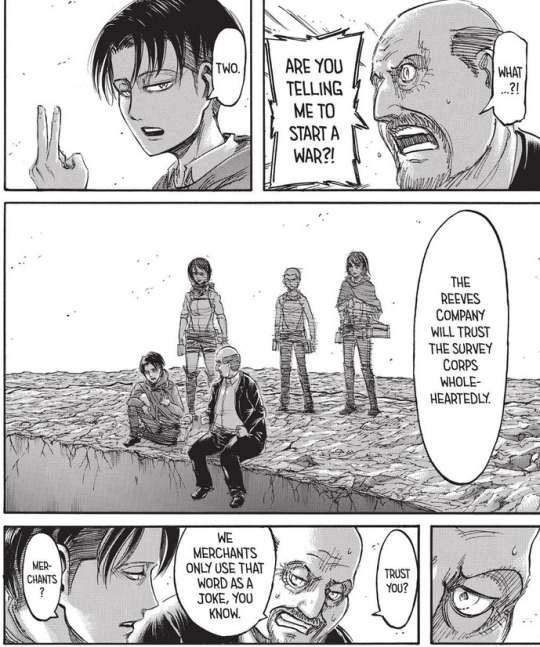
When Levi is laying out the conditions for the deal, it is evident that Dimo does not seem initially receptive. Levi uses the word "trust," which Dimo balks at.
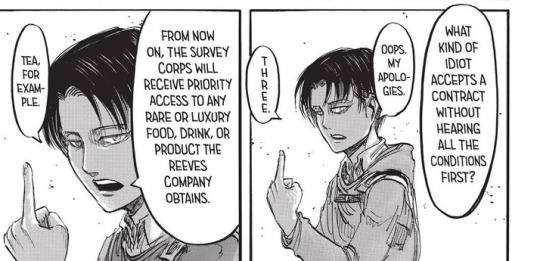
However, Levi's third condition, which is actually the most unimportant and superfluous one, results in Dimo accepting the deal. Why?
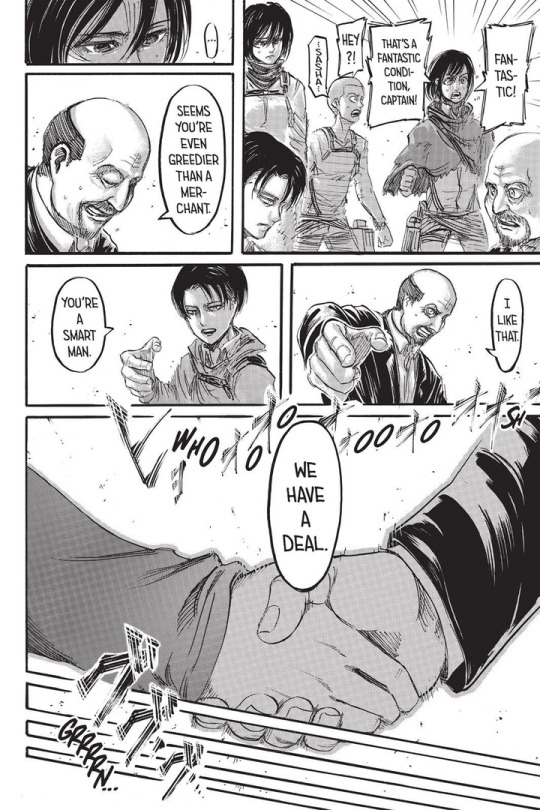
"Seems you're even greedier than a merchant." Dimo says this, as he is familiar at interacting with and respects other merchants. Levi added the third condition in, not simply because he wants tea and other luxurious goods, but because it brings himself down to Dimo's level. Without this condition, the deal may not have gone through. It is exactly this condition that results in Dimo "trusting" Levi as an equal.
This negotiation is also more evidence toward Levi's ability to think long-term. This deal between the Scouts and the Reeves Company benefits the Scouts for the remainder of the series.
III. Luring Kenny Into a Bar

Expanding on Levi's ability to make quick decisions while in the midst of battle, one of the best examples of this is Levi's first encounter with Kenny during the Uprising arc, where Levi lures Kenny into a bar and is able to defeat him as a result.
This goes beyond Ackerman prowess, as that is more related to superhuman strength and heightened combat reflexes. This is specifically a feat of intelligence; it's a sign of Levi's ingenuity—using aspects of the environment to his advantage. By luring Kenny into a bar, Levi is able to procure a weapon to even the playing field. Kenny himself is impressed and adds in that Levi was not taught these tactics by him. Some of the specific tactics of note:
III.a Use of Reflection
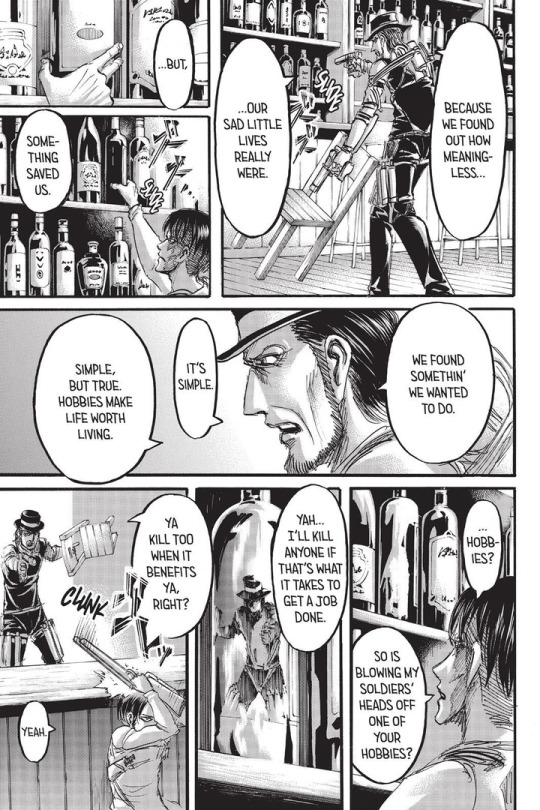
Levi is able to procure a shotgun while simultaneously taking cover from Kenny. He converses with Kenny to keep Kenny focused on him and not the bar's patrons, and even though Levi is facing away from Kenny, he uses the reflection off the alcohol's glass to properly aim the shotgun.
III.b Chair and Figuring Out the Firearms' Weakness
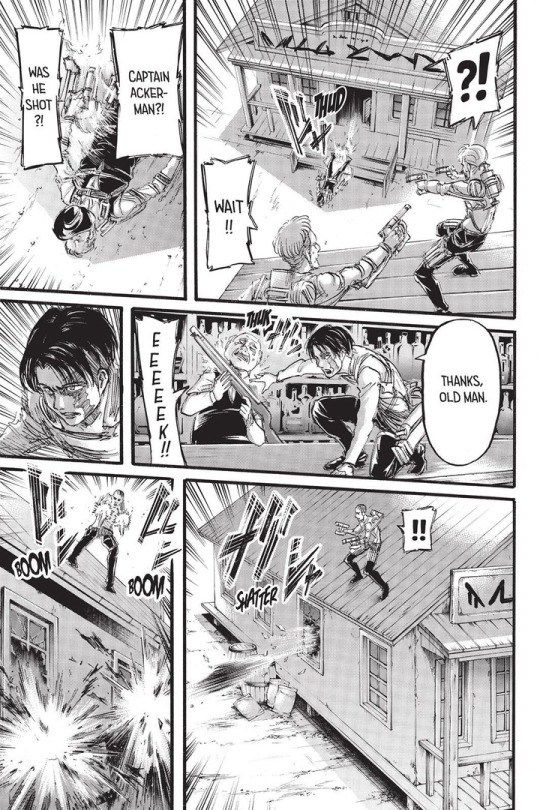
Levi knew he was going to be ambushed from up top as soon as he left the bar, so he threw a chair out the window to both distract and waste his opponents' shots. I'm fairly certain Levi was the first one to notice the main weakness of the anti-personnel vertical maneuvering equipment.
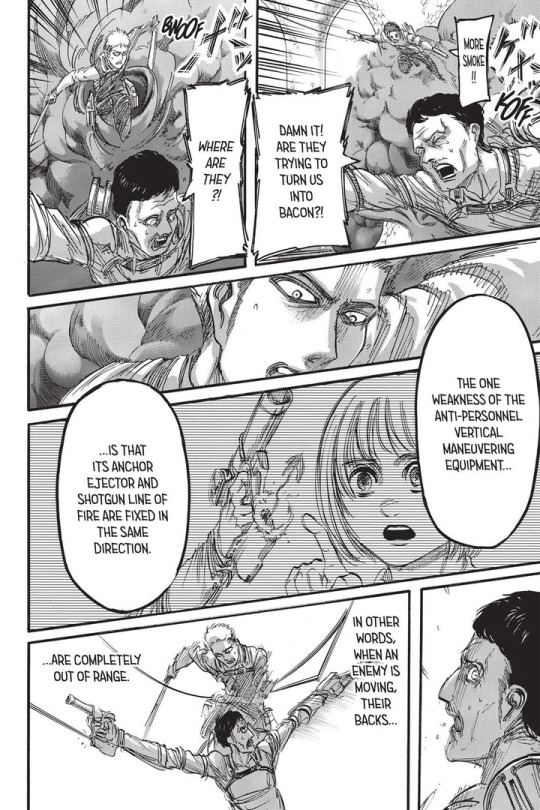
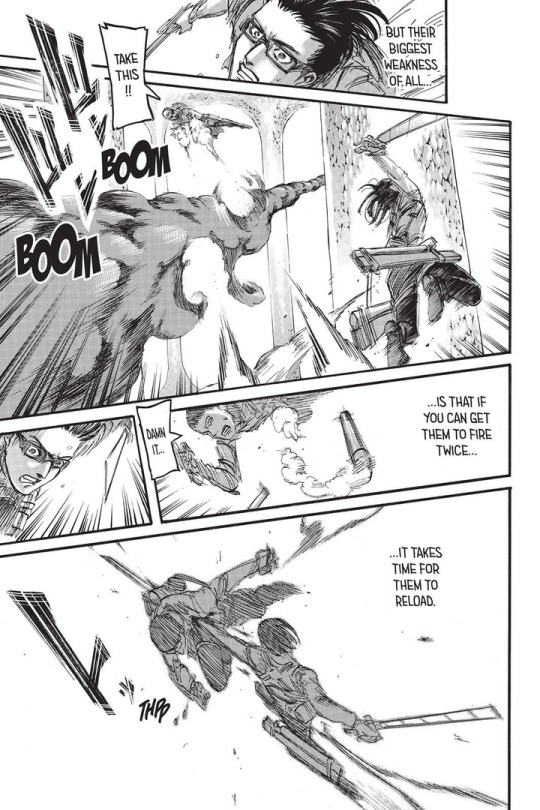
The main weakness, as Armin explains above in a later chapter, is that they need to reload after shooting twice. Levi first threw a chair, forcing one of his opponents to shoot twice, kills that opponent, and then uses that opponent's body as a shield against the other two guys' shots.
IV. Final Battle - Infers Immediately Armin is Alive
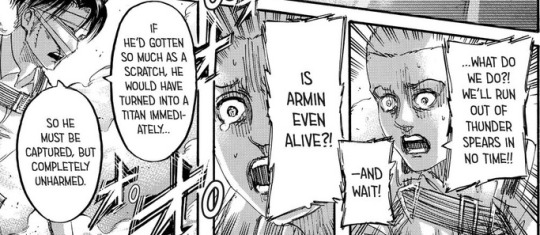
This one is pretty self-explanatory, but Levi is the first to infer that Armin has to be alive, given the way Titan powers work. As such, Levi is able to keep the others focused on the battle in front of them, knowing that Armin is alive and unharmed. This again speaks to Levi's quick thinking while in the midst of battle; it is often more difficult to make these sorts of judgments while in a fight-or-flight situation. Keep in mind as well that Levi is also grievously injured here, so it is even more impressive, how quickly he's able to make this inference.
V. Final Battle - Leadership and Planning
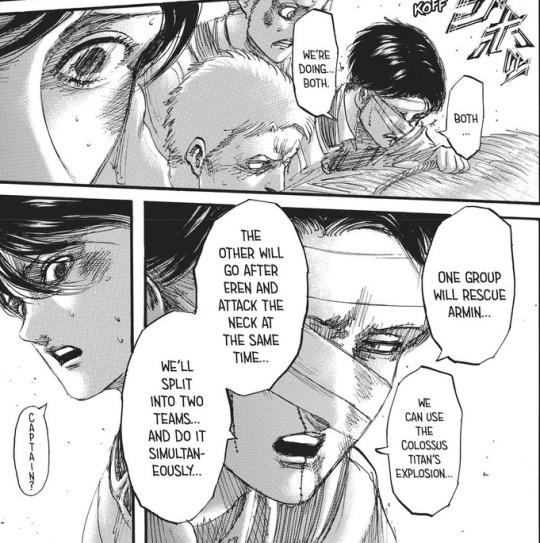
Full stop, the Alliance would not have succeeded without Levi, and part of that is because of Levi's ability to take charge and come up with a plan. This is the plan that they followed throughout the entire duration of the Battle of Heaven and Earth, and it is a plan Levi came up with, directly in response to an unexpected change in circumstances.
This again shows off Levi's skill in adjusting tactics to achieve a strategic objective. Even though the commanders are the ones often in charge of this, Levi is clearly very capable and adept at this himself. Right before this panel, everyone was arguing on how to proceed. Levi came up with the best overall plan, and in addition to that, formulated the two teams required to carry out that plan.
#attack on titan#shingeki no kyojin#levi ackerman#levi aot#aot#snk#attack on titan meta#aot meta#levi ackerman meta#c: levi ackerman#c: dimo reeves#aot.meta#meta.levi#my thoughts
261 notes
·
View notes
Text
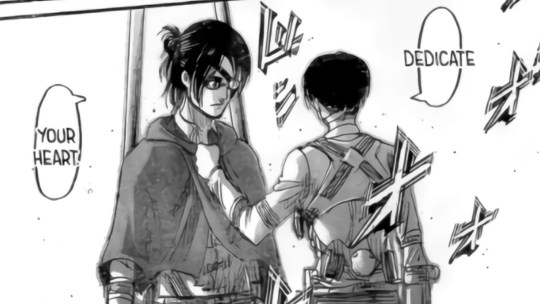
a realization which really clicked for me and allowed me to really reconcile all the contrasting facets of levi's character, is that his almost uncanny ability to continue, his relentless drive —which due to its unwavering nature, can be misconstrued as flawed or unfeeling — is in fact the opposite.
levi is a very passionate character, yet often wears a face of immovability, and i think its not only bc he HAS to — bc levi finds drive and purpose in service and dedicating himself to that which is bigger than his individuality and fleeting concerns — but bc what can read as impassiveness, is actually peace.
levi finds peace in being able to give meaning to those who can no longer fight for themselves, he finds peace in not soiling their memory, in maintaining gratitude for life and pouring his passion into fulfilling their fight. but levi also takes it upon himself to stay strong FOR others, FOR the fight, his composure, like almost all of his facets, is a selflessness.
it never mattered to levi WHO had passed, he was never one for scaling, levi appreciates whoever is placed in his life and takes to their spirits with equal zeal, he was ready to kill for furlan and isobel, ready to die for erwin, and ready to let go of hange in prioritizing their autonomy. and throughout, his foremost priority was an uncompromising pursuit of life, an uncompromising care for a life desired, a life true to itself - his whole mission is affording ppl freedom after all, securing them their humanity.
which is why seemingly failing the ppl in his life — e.g. erwin, kenny — makes him so angry (there's more to this tho, cant get into it w/o being shippy lol).
however, the thing, (or person lol), which really cemented my stance, is levi's last interaction with hange, you can feel him pause, you can feel the weight and history and burden of being asked to let someone he cares deeply for, sacrifice themself unchallenged, of standing unequivocally between that. But Levi recognizes his irrelevance in the equation, he recognizes Hange's sincerity, he recognizes the weight of their sacrifice, and in that is able to tell them that whatever they do, they should dedicate their heart, he's able to recognize hange's autonomy, their passion THEIR life, and what giving it means to them, and is able to find peace in knowing that hange lived as they died, fully.
he lets them die with no regrets.
levi is the personification of one's dedicated heart, he is uncompromising faith, he is unflinching support, and he is relentless sacrifice. levi is life, and he is proof of life after death, and he is, primarily, peace after death - peace in dying for having lived.
#aot spoilers#levi ackerman meta#hange zoë#ramblings#shinzou wo sasageyo#shingeki no kyojin#hange d wording made me SOB like a bb god that will never not get to me :)#aot#the finale making like NO noise in the mainstream & irl circles is so funny to me idk#have more to say but am fartbrained#this post was obligatory - i did NOT want to type#dedicate your heart#snk eruri#levi aot#levi attack on titan#captain levi#hange zoe#if this is badly written idc anymore dk what to tell you. be nice or smth idk
27 notes
·
View notes
Note
PLEASE write about Levi’s mental state, i’m begging you
He’s faced death and precarious situations since he was born, yet he’s still standing strong and hopeful, WHAT THE HELL I LOVE MY SHORT KING
IT'S FINALLY HERE😭im sorry anon i hope you're around to see this and if u are i hope i dont disappoint
the tone in this analysis is so weird because i kept getting caught between 'this is an apa paper no contractions, academic language, double spacing -' and 'this is a tumblr post about a fictional blorbo wtf r u on'
i also use some scientific language i try my best to explain but if this turns anyone off i don't blame them because im unhealthily obsessed
*i'm a third-year undergraduate psychology student w/ a concentration in psychopathology
tw/cw: discussion of childhood exposure to sex (not assault)

Foreword
I’ve been putting this off for a while (I’m forgetful and this topic is intimidating what can I say), but being a year out from graduating with my bachelor’s to become a mental health professional, and being a Levi scholar(/hj), I wanted to give this a shot.
I wanted to dissect and examine Levi Ackerman’s mental health “currently” (as in general canon), and explain as thoroughly but as simply as possible how and why he thinks and acts the way he does.
Seeing how AOT is pretty renowned for leaving out the ‘insignificant’ details, especially character details, a good majority of my assertions and even details of his life are built off of correlations and “signs and symptoms”; meaning some things could be an aspect of Levi’s personality, or a symptom of psychopathology.
I will examine his childhood (especially his childhood), adolescence, young adulthood, and “present” adulthood, with a short summary at the end of where he might be mentally after the war.
*Lastly, I don’t like it when things I say about a series or character are taken as fact or make it implied that someone else’s thoughts are “wrong”. This is partly built on headcanons anyway, which are influenced by my own experiences. Don’t take away from this that this is me telling you what to think.*
Childhood
The most important period of development occurs in infancy and childhood, especially from the ages of 3-6. This is when a child learns where to find security, love, and basic skills, gaining stability as they develop.
Well, Kuchel died when Levi was 4.
Maternal Love / Learning Empathy / Anxious Attachment Style
Levi was born into deep poverty within a violent unwelcoming environment. Basic physical needs must have been very hard to meet (i.e., consistently fed enough, a clean environment, no physical threats). And where Levi was born is like the dictionary definition of a bad environment for a small child, excluding only his mother’s care and love.
As it’s generally understood in canon (and suggested from Levi’s special backstory manga so far) she was a caring parental figure early in Levi’s life that loved him unconditionally. We can conclude that Kuchel did everything within her power to compensate for both parenting Levi alone and shielding him the best she could from his horrible surroundings, teaching the kindness, goodness, and love that Levi would internalize and go on to strive for for his entire life.
As far as we know, no other children lived in the brothel. Socialization is just as important for a young child as receiving love. With this isolation, it’s extremely difficult to learn how to connect to other people, or pick up on social cues. Levi would’ve never learned how to interact properly with his peers—aside from use of aggression and violence which Kenny would go on to instill in him.
With the danger/anxiety imposed by strangers, mostly if not entirely men, he would turn to his mother for comfort all. The. Time.
And she would give him that support and affection of course. This early motherly affection is integral to child development: a child who receives empathy and affection is subliminally taught how to feel and express empathy towards others.
While Levi’s surroundings were dangerous, lonely, and chaotic—traumatizing enough for a toddler or young child—Kuchel provided a safety net from that, so I think that Levi developed an anxious attachment as a child: exhibiting clinginess, excessive fear of abandonment, and an excessive need for security and/or reassurance.
Paternal Trauma / Potential Androphobia
Born and living in a brothel, we can assume that Levi was probably seen as a burden and a mistake by others, especially by men (both the likely majority of her customers and her boss).

AOT ch69; Before the Fall, ch34
This is likely in contrast to the women (those living and working in the brothel like Kuchel). They should know Kuchel if not as friends, then acquaintances who could empathize for her and her son.
There’s an obvious trend here. If Levi is going to feel fear/danger/anxiety because of men, he should have a general aversion to men and-or the behavior of men who he encountered as a child. This is impossible to know for sure or in meaningful detail, but it seemed to be resolved by the time he became an adult if so.
Although Kenny in his words was no more than Levi's teacher, Levi did see him as a father figure.
The subject of Kenny will be expanded on later, but it's clear Kenny in no way resembled a father, who also would go on to abandon Levi (at the age of 11 or so). Children without father figures tend to struggle more emotionally, psychologically, and socially. Specifically, (especially boys) tend to exhibit intimidating/aggressive personas to compensate for resentment, fear, and unhappiness.
Sexual Trauma (Tangent, Probably)
This is unconfirmed but a likely trauma Levi went through: exposure to sex as a child. There’s no way to confirm what he experienced, so I’ll function on ‘probably’s’ and ‘most likely’s’.
Because Levi and Kuchel only lived in one room, other rooms in the brothel should have belonged to other women, and he was at the oldest four, I wager that he was babysat by women who Kuchel knew and/or was made to hide somewhere while she worked, such as in a cabinet.
(for reference)
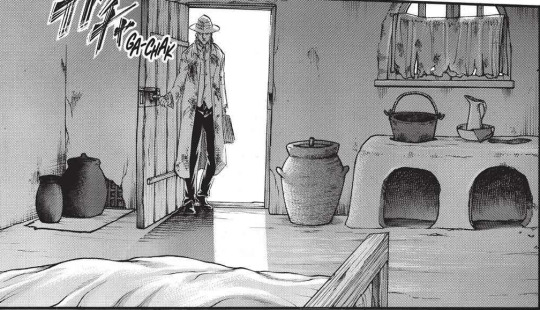
AOT ch69
The odds are high that he was exposed to the aftermath of sexual violence (i.e., marks seen on his mother), and the sound or smells that have to do with it. That young, he wouldn’t know what it was, but he should have realized later as an adolescent.
In general, children regardless of gender exposed to sexual content usually experience early puberty (which is just as likely for impoverished children, or children who experience chronic high-stress in general); issues with intimacy; become desensitized to high-risk behavior; negative/inaccurate expectations about sex and relationships in the future; influence inappropriate behavior with other children or adults; sex addiction.
This is especially relevant to Levi’s fear of closeness/intimacy in the future. Exposure to sexual situations—possibly not including CSA in his case—very early in life inflicts on a child emotions and stress they don’t have the intellect or reasoning to process or understand. An extreme aversion to interpersonal relationships, especially physical ones, results.
This stress Levi must have felt, being powerless to this happening to his mother, is a different beast. Children aren’t capable of handling high levels of stress, and so the brain will automatically create coping mechanisms: dissociation (a severe form of “zoning out”; observing the self “from the third person”; numbness; the feeling of living in a dream), excessive daydreaming/overactive imagination, symptoms of PTSD (nightmares and terrors; flashbacks; spontaneous activation of fight-flight-freeze associated with anxiety; excessive worrying/fear; loneliness/self isolation). PTSD will also be prevalent in Levi’s later life, which I’ll delve into later.
Inappropriate behavior and sex addiction are also highlights for me because they shouldn’t exist in him based on Levi's personality and behavior throughout the series. In my opinion, Levi ought to associate sex with pain, shame, and violence; he does see it as an ordinary job—a means to an end. He should be desensitized to sex as a concept, but associates it personally with shame, sadness, and pain, possibly feeling disgust towards it. So it is highly likely that Levi in every stage of life following this experienced sexual repulsion (usually associated with high anxiety towards sex), a low libido, or a lack of sexual desire entirely.
From a trauma perspective, he could avoid sexual topics of conversation, sexual settings (i.e., brothels), or an array of things which are sexually suggestive or he as a child possibly associated with sex (i.e., cleavage, panties, specific touch). Similarly, he might avoid direct reminders or have a post-traumatic reaction to them, such as anxiety or flashbacks (i.e., the sound of a bed creaking, the sight of wet clothes).
Importantly, it can be concluded that sexual violence was often exhibited, and the idea would be ingrained in him that sex, like everything else besides his relationship with his mother, is “give-and-take”, “victim-and-attacker”, and learn to be repulsed by intimacy. This impacts his willingness for later friendships and relationships as we’ll see later.
Early Abandonment & Early Exposure to Death
As Kuchel’s health deteriorated, Levi’s sense of security would break down. Availability of shelter, food, and emotional support would be even less secure than before. He might have been providing for Kuchel for some time, even, as it can be gathered that he received little to no help from those around him while she was sick. To whatever length he had to take responsibility and both fear for Kuchel, this would cement a sense of responsibility and guilt in him from the age of just four years old.
He will fail to save her—regardless of the fact that that’s not his responsibility in the first place; a child wouldn’t understand that—and then lose her with nothing he could do to even cushion the blow.
How powerless he must’ve felt. How hopeless. How likely is it that Levi found comfort in joining her? A child his age wouldn’t be able to comprehend death, basing our understanding on Piaget’s theory of cognitive development. To summarize, at the age of six or seven, children aren’t capable of complex, abstract thought like death or the finality of it. But Levi had to learn early.
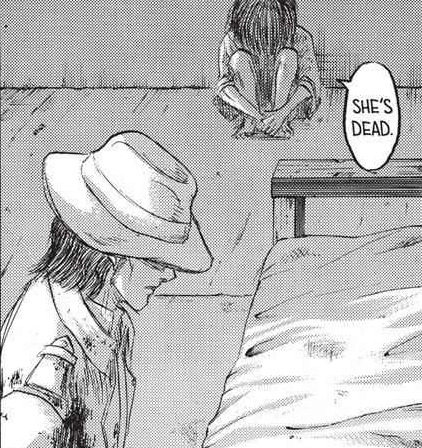
AOT ch69
This will be center in his “clean-freak” tendencies later.
Adolescence
Most of this section is going to be rather vague again, but we already got the bulk of that over with in childhood!
Emotional Train Wreck / Lack of Identity
It’s hard to notice if you’re not paying attention, but in every scene we’re shown with Levi after his mother dies but before Kenny leaves, he’s wearing some variation of his mother’s one dress styled into a shirt. He loves her endlessly, even or especially in death. And part of cherishing her memory, to him, should’ve been taking after her as much as he could.
That’s how to explain why he didn’t become a cruel person (Kenny for instance) as he grew into a teenager, even though much of Levi’s outlook and behaviors come from him (ch57).
The more pertinent question is how extreme violence, reinforcement of the idea that that violence is power, and Kenny’s total (or most likely total) lack of communicated emotional connection affected him.
Levi would still desperately want that connection deep down, especially with his mother gone. This is a major reason why Levi sought to get stronger to please Kenny. For chronically abandoned people, that continues into adulthood and even beyond. A hole inside which can't be filled.

AOT ch69
Chronic loneliness—like I explained before—basically explains his aloof nature and awkward disposition. It’s not that Levi feels as detached as he looks, but he doesn’t know how to express himself or open up. He wouldn’t learn how to process his emotions, let alone talk about them. He’s basically emotionally stunted and immature in impersonal relationships (between friends and especially in regards to intimacy).
The Underground’s environment also makes him socially awkward, rude, of course stoic/not very expressive, and blunt. Levi was forced to become extremely observant of people to suss out their intentions, remaining vigilant of his surroundings at all times.
Levi doesn’t even get affection in any sense anymore. He doesn’t get a hug or a pat on the back, and he certainly doesn’t get a shoulder to cry on.
If anything, Kenny would punish him for showing weakness. Vulnerability is weakness; weakness is death.
What results is a continuous and boundless sense of emptiness inside that can’t be filled. He’s plagued by a chronic sense of unbelonging and loneliness. There’s no time or opportunity to develop “normally” as an adolescent. Socialization is limited at best; thinking of his place in the world is irrelevant when his one and only most pressing goal is survival; he doesn’t get to explore hobbies or interests.
OCD Propensity
One “interest” Levi is passionate about is cleaning, at least. Disease is what caused his mother to die. The easiest cause to point to would be their disgusting surroundings (although, Kuchel was infected by a customer). It is canon that Levi’s love of cleaning comes from "his personal experiences". In that interview, Levi first specifically references the important of fighting disease.
In other words, his "clean freak" nature comes, primarily, from the death of his mother: Filth -> disease -> death, and abandonment by extension.
His mother would’ve encouraged him to keep their room clean. There were times he or she had to have come down with something and dirtiness was the cause. On top of Kenny’s enforcement to keep up “clean” appearances to garner respect from everyone else in the Underground.

This in particular is extremely relevant to his mental health. When someone feels out of control of what is happening to them, especially in a recurring way, and especially as a child who doesn't yet know how to feel stable in an unstable environment, they look for something to control. It can be weight, bodily functions (blinking, breathing, etc), dominance over others, or cleaning, for instance.
Fear of disease, the urgent need to have control, and the basic need for stability makes it obvious that Levi would become obsessed with cleaning. And moreover, developing OCD (Obsessive Compulsive Disorder). I’ll go deeper into this diagnosis later.
Lack of Self Worth
Despite the acknowledgment throughout canon that he trusts in his own strength, it wasn’t always that way.
Canonically, Levi sought praise from Kenny by showing his strength because that was the only thing he received praise for. The conclusion Levi came to once Kenny left him was that he wasn’t strong enough (wasn’t good enough) to warrant staying with him.
In conjunction, Levi’s first conclusion was that he did something wrong, not that Kenny possibly had some obligation that forced him to leave the Underground, pointing again to his own lack of self-worth.
This scenario created a complex in him, the very root cause of Levi’s pain, the very foundation of what Levi would go on to prioritize in adulthood. If he isn’t useful to those he wants not to abandon him, he’s worthless. He’s only useful when he shows his strength. Every other aspect of him like his interests is either irrelevant or bland by default in his eyes.
He would go on to make it his mission to try his best to be good enough in order to save and protect the lives of others, but foremost those he cares about.
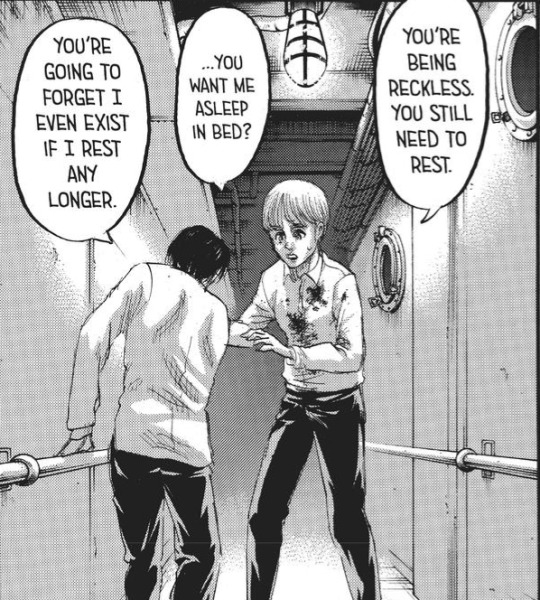
Young Adulthood
Our first exposure to Levi as an adult is in A Choice with No Regrets, his OVA/backstory.
(By the way, I’ll be basing this analysis off a mix of the manga and the OVA.)
Emotional Immaturity/Affective Dysregulation
Generally, Levi’s defining negative character trait as a young adult is his emotional immaturity/anti-social behavior. Yes he’s grumpy and rude which is always indicative of him, but he’s very quick to anger, too. He cursed at the Squad Leader who offended him (by assuming that because he, Isabel, and Farlan are from the Underground, they’d be dirty), and argued furiously with Farlan that he would kill Erwin—not because it was required for the job, but because he disrespected him—for a few examples.
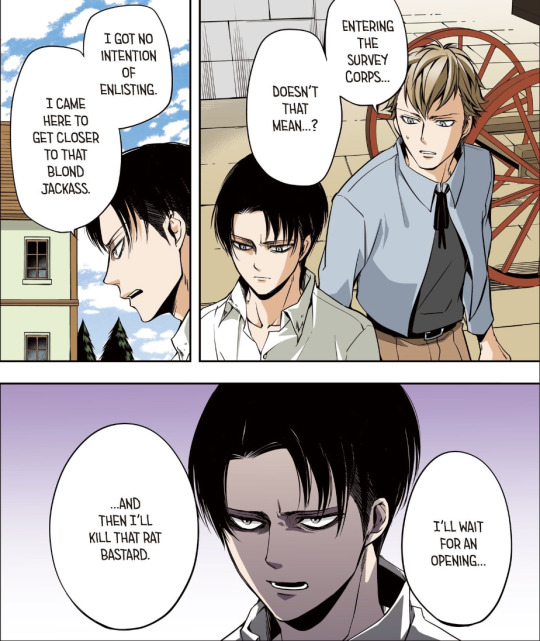
ACWNR ch2
He tended to be arrogant, too. Such as when he ultimately called a Scout who had experience with the Titans stupid for telling Levi to hold his swords in a certain way. He spoke to every officer the same as he would anyone on the street, having a remarkable lack of basic respect for authority. He was insistent on distancing himself from the entire setting and structure of the Scouts as much as possible, both to not get attached, and he found their mission childish/foolish.
He’s rather selfish. There is nothing Levi cares about genuinely more than Isabel’s and Farlan’s lives and the job that will set them up with a good future. Farlan’s advice is the only one’s he takes and the only judgment outside himself that he considers, such as when Farlan asks him to not cause trouble with authority to keep a low profile, but even then he acts stubborn. Levi trusts nobody wholeheartedly except himself (until later in ACWNR).
There’s a cognitive dissonance in him. Growing up, and still as a young adult, Levi’s headspace is marked by fear and uncertainty, with his power as his source of confidence. The first time he kills a Titan (with Isabel and Farlan), he uses too much gas because he refuses to potentially risk his friends’ lives; when the expedition is upcoming, he abruptly tells Farlan and Isabel to find a reason to stay back, and that he’ll complete the dangerous part of the job on his own.
Levi is full of repressed fear and uncertainty. He hides and/or buries all of it for the sake of self-preservation both emotionally and physically.
Antisocial Personality…?
It’s extremely interesting how a character as selfless, heroic, and empathetic as Levi exhibits antisocial symptoms. I’d even argue that if his childhood was spent entirely without his mother figure, then he might be a dictionary definition of ASPD (Antisocial Personality Disorder).
People with this disorder live day-to-day under the constant assumption that whoever is around them is “out to get them”/searching for a weakness to exploit. Humanity is made up of only prey and predators; morals are completely subjective, perpetuated by the society that surrounds them. This constant need to defend oneself, the effect of the exact trauma the potential sociopath experienced, combined with a muted emotional spectrum, results in a complete disregard of everything, including people outside of themself. They might believe they’re entitled to comfort or admiration, but overall, they’re intensely self-serving, often aggressive, and ruthless.
Because Levi for instance learned to rely on violence both for “love” and survival, then he might fall on violence to manipulate a person or situation into serving himself. I see reason to believe that Levi could have grown into worse than Kenny’s image if it weren’t for his mother’s influence.
However, the greatest cause for deniability is Levi’s wide emotional spectrum (especially including empathy and shame), while a lack of shame is the most significant marker of ASPD . (It is arguably one of many testaments to his strength that a victim of so much suffering, violence, and cruelty could become a man as empathetic as him.)
However, these tendencies may still be relevant: A sense of arrogance—both to the way Levi thinks of some who he perceives as weak and live without good morals—lacking issue with using deceit or violence to attain a goal, and living outside the rule of authority.
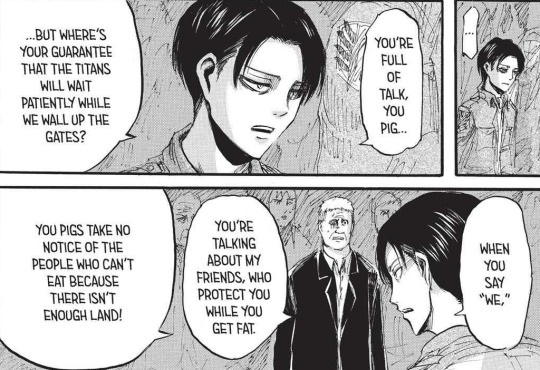
I go into more detail about this idea here.
Conclusion
As is true in general, there’s very little to say of mental development once someone has reached their early–mid-twenties. What we know of Levi’s young adulthood does reinforce his fear of abandonment, but he finds a cause where his strength and compassion can be “put to good use” and give to him a life that is worth living.
Conclusion: the ‘Present’/Diagnoses Overview
C-PTSD (Complex Post-Traumatic Stress Disorder)
Levi’s emotional dysregulation (i.e., inability to sit with and process negative emotions), his difficulties in relationships, insomnia, negative worldview, absent sense of self, and finally, his persistent sense of unworthiness/worthlessness are all indicative of C-PTSD. It’s distinct from PTSD in that he didn’t endure one short-term traumatizing event, but he grew up surrounded by trauma and saw it as normal (e.g., gang violence, extreme poverty, death of a parent, (more presumably) physically and emotionally abusive parental figure). Levi as a child developed no understanding of a nurturing, secure environment.
Negative/Absent Sense of Self
I’ve talked about this at length already, but it’s worth noting how Levi’s perception of himself must have changed when it was revealed that he is extremely strong physically not from his own efforts as much, but because he’s an Ackerman.
His self-confidence and self-worth have always been built on the foundation of his strength. He’s useful if he’s strong, so he’s worthy if he’s strong. Along with the extreme high pressure his goal to kill Zeke put on him in season four, he might have gone to extreme measures to compensate for his strength he might have felt was “unearned” (such as excessive exercise for example). This is an aside, but it was a blow to him for sure.
Emotional Dysregulation
The causes of emotional dysregulation generally which he experienced are as follows: early childhood trauma, feelings ignored, judged, or invalidated at a young age, and physical and emotional child neglect. Beyond his first four years of life with his mother, Levi experienced all these things (early exposure to sex and likely exposure to domestic violence aside).
It’s important to focus on emotional neglect specifically, when any and all perceived “weakness”, no matter how small, is unacceptable to Levi. He will never ask for help (being independent to a fault), he can’t define or process his emotions, and it doesn’t occur to him—and it could be a shock—when he learns that his friends care about him, not him insofar as how useful he is.
As an adult, Levi appears to be emotionally mature, but I argue that this isn’t the case. It’s more accurate to say that he has better control over his emotions (in that he buries them or ignores them) with a mature outlook because of all his experiences with suffering.
Similarly, he’s not outwardly emotional not because he’s antisocial (as related to ASPD, not introversion), but because he’s so “emotionally constipated” that he’s numbed the vast majority of the time.
Relationship Issues + Fear of Abandonment
Because of his fear of abandonment and impaired emotional intelligence in close relational conflict, he’s extremely passive and/or passive aggressive. In order to avoid potential abandonment, he doesn’t go out of his way to win major arguments—such as threatening to break Erwin’s legs if he didn’t stay away from the expedition in season three, but ultimately giving in. He’s also more likely to sneak petty insults into arguments, give “silent treatment”, slam doors, etc. His kindness and exceptional empathy shouldn’t let him be physically or overly violent.
These are likely additions to why Levi doesn’t foster many close relationships.
Fittingly, as a child I thought that Levi might have had an anxious attachment style (clingy, excessive need for security), but as this possibility for security was removed entirely, and he was taught to not rely on others, he would develop more of an overt avoidant attachment in adulthood in combination (fearful-avoidant): making very few emotional demands—even though he has needs—withdrawing when there’s conflict, acting aloof yet fearing abandonment, having difficulty expressing emotions he feels intensely, and fear of depending on someone else.
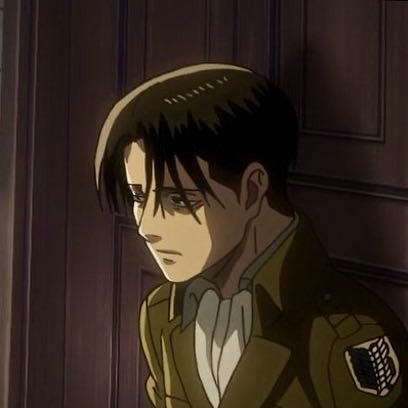
Anxiety
His cool-headedness even in the heat of battle/war (other factors like experience aside) is exactly what you would expect from someone diagnosed with C-PTSD; he’s accustomed to chronic high-stress. But small stressors (i.e., a change of plans) are overwhelming and make him quick to anger/excessive annoyance.
OCD
Emotional dysregulation is also closely associated with OCD.
OCD is much much more than being concerned with keeping clean or organized. OCD is an anxiety disorder composed of anxiety-related obsessions and compulsions, such as frequent and disturbing thoughts or images (intrusive thoughts). These attempt to be managed through rituals (i.e., handwashing, counting in patterns). Although symptoms will fluctuate with anxiety, OCD at its baseline is a distressing disorder.
Since he was young, Levi should have had an incessant need to be in control at all times. A shining example of this is his mother’s death, an incident he couldn’t control but included dirtiness/disease as a cause he could pinpoint, so this anxiety with dirtiness becomes a major obsession, and the compulsion is cleaning. (Putting aside the fact that Levi enjoys cleaning by itself too.)
It’s a widely-held belief that if Levi has OCD, it’s contamination OCD, as it specifically has to do with an obsession with dirtiness and a compulsion in cleaning (i.e., damaging handwashing, ritualized bathing that may take hours). However, based on the multitude of times Levi was covered in blood and remained unbothered by it (Titan and human), and in fact the obsession’s lack of relevance entirely during urgent missions/situations, contamination OCD is simply not plausible. Instead, it’s general OCD.
There’s no way to know for sure, but I don’t see his OCD as mild or severe. Levi is an extremely orderly and balanced person, so it can be concluded he must have things done a certain way, routinely, organizational, or planned; when the dirtiness is “negative” (i.e., Titan blood, blood on a knife he used to kill Isabel’s attackers), he is never more rigid with cleanliness; it’s probable he suffers intrusive thoughts (likely of the violent nature), a fear of contamination, and/or counting ritualistically, but the most obvious compulsion is cleaning. He might have sensory issues, such as disgust if he happens to brush shoulders with a stranger; aversion to particularly bright lights, irrational rage towards “mouth sounds” (i.e., chewing, coughing, swallowing), etc.
EDNOS (Eating Disorder Not Otherwise Specified)
Levi should have a complicated relationship with food to say the least.
In the realm of eating disorders, EDNOS is sort of a catch-all term when an individual doesn’t qualify for the diagnostic criteria of anorexia or bulimia, and it encompasses lesser-known eating disorders like Pica. It’s the most common diagnosis for clinical eating disorders.
I already covered how integral the early years of life are, and beginning at a young age, if children aren’t given a basic need like food, and they must seek out food on their own, it becomes an anxiety deeply rooted in the brain regardless of how well-fed they are when they’re older. There will always be an urge to have food available. Levi’s years in the Underground were spent either actively starving, or going about every single day having acquiring food as top priority. He was a young adult when he left, so it’s impossible to unlearn this (without extensive therapy, which Levi doesn’t seek). It’s similar to compulsions found in OCD: even though he logically knows that there will be a dinner after lunch, it’s impossible to put aside this worry.
That may mean always having food stashed, eating too much—especially in his early years Aboveground when he’d eat as much food in a day than he’d eat in a week Underground— stealing food, or eating way too quickly (as someone who lived in a place where food was considered something of a luxury resource and threatened being stolen at any time).
The latter factor contributes to Levi’s suggested preference to only eat alone—joining the fact that Levi only eats with Erwin after expeditions. Eating in front of others should be considered a weakness to him.
As time passes with this easy access to food, combined with his extremely narrow sense of what makes him “good enough”, his relationship with eating may become toxic. Especially when the stakes of his worthiness are so high—literally life and death. He may think that he’s privileged to eat at all, and when he feels worthless, he restricts himself from that “privilege”.
He may be so accustomed to the feeling of hunger, that it doesn’t immediately register with his mind when he is hungry.
Lastly, he may have a generally low appetite. This is often associated with depression, but depression is comorbid with C-PTSD.
Misc.
Some tangents/miscellaneous speculation about Levi’s psychology:
Queer?
Sexuality is formed and shifts due to a wide variety of factors, which most if not all are terribly understudied: genetics, hormones, and your environment/experiences. So again, my speculation.
With his fear of close relationships and negative experiences with sex, I think he should land somewhere on the queer spectrum, specifically under the asexual or aromantic umbrella (i.e., pansexuality/being panromantic (attraction to personality) and demisexuality/being demiromantic (attraction only to those he has an emotional connection to)).
MDD
The odds of Levi having MDD (major depressive disorder/clinical depression) are iffy. Most if not all of the symptoms are comorbid with childhood trauma and C-PTSD: Such as persistent apathy, guilt, and/or discontent; sleeping too much or too little; lack of energy; reduced or heightened appetite; irritability.
Oftentimes, depression, C-/PTSD, and related mental illnesses cause unexplained physical pain, such as back pain and occasional tension headaches. “Stress hormones” like adrenaline are built-up in the body, and usually persist without physical therapy and-or medication (Disclaimer this mention is based on nothing more than Levi always standing with at least one hand on his hip).
Body Language
Similar can be said of his body language from a cognitive perspective. The vast majority of the time, Levi has himself closed-off in some way, usually by crossing his arms to protect his chest; a subconscious barrier between oneself and another person.
Also see this official art of Levi asleep.
Afterword
We’ve known it’s not just Levi’s physical strength and skill that makes him the strongest, right? It should take immense mental strength to make it day-by-day dealing with the trauma and issues that he does, but not only has he survived and continues to, but he lives heroically, selflessly, with the wellbeing of everyone around him as a top priority. He buries all of his pain by moving forward always and without exception regardless of how painful the present is. Living with “no regrets” should in mental respects be a guise for pushing his trauma down, too; there’s just no words that can properly do Levi’s resilience justice.
Part of me wants to go into detail about his later adulthood, but given how very little we know (right now), I think it’d be too speculative.
However, based on what we have seen at the ending of AOT, it’s comforting to know and plain to see that Levi wasn’t defeated when he “lost” the reason to be so strong, and even his strength itself; he didn’t lose his love for his friends nor of life.
In middle age, based on Erikson’s psychosocial stages, the conflict that should enter Levi’s life is the idea of generativity versus stagnation. He seems satisfied with his life despite the negative effects of all he went through—grief, physical disability, inevitable mental scarring—and he’s still concerned with helping others, especially the younger generation in a world after the overwhelming devastation that was the Rumbling.
My speculated psychopathologies/diagnoses of Levi:
C-PTSD (insomnia prevalent)
OCD (contamination obsessions)
EDNOS
#levi aot#snk levi#levi ackerman#levi attack on titan#captain levi#captain levi ackerman#aot levi#aot levi ackerman#attack on titan levi#aot meta#levi heichou#rivaille heichou#levi rivaille#rivaille ackerman#lance corporal rivaille#levi snk#levi.thoughts#aot#attack on titan
249 notes
·
View notes
Text
For People, Not for a Dream
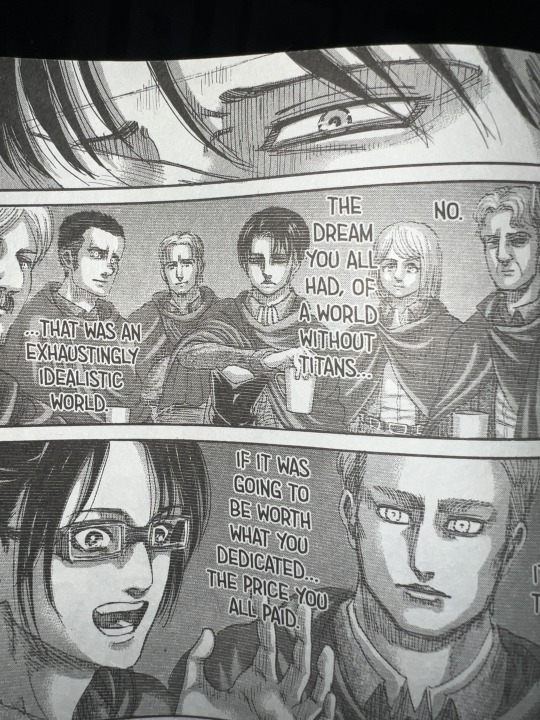
Everyone always wonders about this panel, and why Levi didn't include himself when talking about what all his comrades fought and died for.
The thing is, Levi was never fighting for that ideal world, or to create an ideal world.
For him, it was never about a concept or an ideology, because he never believed in the possibility of an ideal world to begin with.
Even when he gives his monologue to the 104th, during the Uprising arc, and speaks about freedom and the chance to have a world without the threat of titans, he still says that both world's are hell, just that he chooses the hell of people killing each other over the hell of being eaten by titans.
So I think to understand Levi, it's important to understand that he never cared about or was motivated by any system of belief or philosophy. He never did what he did with the goal of creating some Utopian world or society. His actions were never driven by any sort of fanaticism.
He was only ever fighting for people. To help people. Even in their ugliness and with all their faults and failings. He accepted that about people and the world; he accepted their imperfection. He never tried to change anybody, he never labored under any sort of belief that he could weed out the bad elements of society and, as a result, force a better world into existence, or a more civilized society. He wasn't blinded to the ugliness of his own actions by a sense of moral righteousness or belief in the "greater good". He never believed any set of beliefs or principles or ideology was or could be made inherently superior to any other. He never believed people could be made better than what they were. And yet he still found their lives worth protecting, along with their right to choose what to do with those lives, whether it be good or ill.
I think that's a big part of why Levi never loses sight of his own humanity, why he never becomes cruel. Because he never loses sight of what he's actually fighting for. Not an idea or a set of beliefs or a dogma. But just people, even when they're not good people.
And we see that reflected in Levi's lack of any sort of dream for himself, and in his support of other people's dreams. He's not fighting for their dreams because he believes in them or their possibility, he's fighting for their dreams because he believes in the worth of the people who dream them. It's the people who have worth to Levi, not the dream or the ideology behind the dream. And he hoped to prove that worth by ensuring they didn't throw their lives away for nothing. That's why he lent his strength to those dreams. It was always for the dreamers sake, not the sake of the dream itself. To show their lives mattered by helping to realize whatever it was they gave those lives for. It's why he's so determined to kill Zeke, because those soldiers in Shinganshina gave their lives for that goal. It wasn't Zeke's death that mattered, but the lives of the soldiers that died for it.
It's why he says in the above panels that if it was going to be worth the price "you all paid", it would have to be an "exhaustingly idealistic world". Nothing less than that would be worth people's lives. I think it's also why Levi's expression is one of such sadness all through the final chapters, because he knows, and always knew deep down, that that idealistic world was an impossibility. That even without titans, the world would still be a hellish place, something we see proven by the final pages of the story, with the destruction of Paradis and the continuation of war. In the end, I don't think Levi believed the outcome was worth the price his comrades paid. It wasn't worth their lives. To Levi, the concept of a "greater good" isn't worth more than any, single life.
But it's also important to remember that Levi was never the type of person to tell anyone else what to do, or what to think, or how to live, and that in itself is testament to how much he values people. The worth he sees in their lives and existence is reflected in the respect he holds for their right to choose what to do with those lives, even if that choice is to give their lives for an impossible dream.
And so that's what he fights for. Not for any sort of dream, or for the realization of an ideal world, but to help people. To help them in whatever way he can, whether that's saving their lives, protecting their right to choose how to live those lives, or supporting the dreams they believe are worth giving their lives for.
It was never for the dream itself. It was for the people who dreamed it.
158 notes
·
View notes
Text
This has probably already been said, but I have to talk about the courtroom scene and why it was a fantastic introduction to not only Levi, but Erwin too—and their relationship.
So we first meet Levi in the heat of battle. We see very quickly the type of fighter he is—confident, but not overly so. He has a strong command of himself and the people under him. He’s The Guy.
Then Erwin shows up and announces they’re pulling back—Levi immediately argues this. We might assume Levi is being set up as the guy who ~doesn’t do well with authority.~ You know the type. He does his own thing. Doesn’t play well with others. Chafes under orders. He’s too big and too important for all of that!
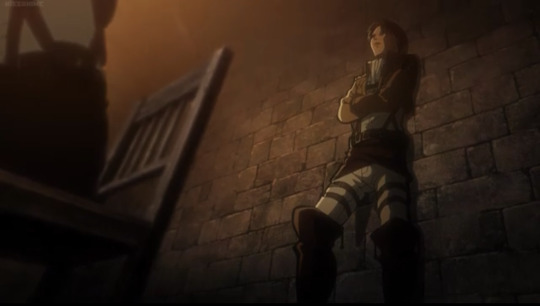

This impression continues when Eren meets Levi and Erwin in the dungeon. Levi is rude and mouthy, and Erwin’s chastisements do little to curb this. Levi’s confidence and skill give him authority issues…right?
So then we move to the courtroom scene, Eren’s trial. Erwin says beforehand that he has a plan, but we’re told nothing more. We see him propose to the court that Eren be given to the Scouts, and he says nothing more.

Levi is the one to scathingly go after the MPs during the debate, pointing out the flaws in their plan and how likely it is that they’re trying to save their own skin. First time viewers might assume that, again, while Erwin is a charismatic leader, he doesn’t go far enough. Levi is the one to say the quiet part out loud, to go to the places Erwin’s too ~respectable~ to go.
Then things start to go sideways. The court’s favor seems to be turning against Eren and the Scouts, fear and paranoia winning out. Eren is getting desperate.
Enter Levi.
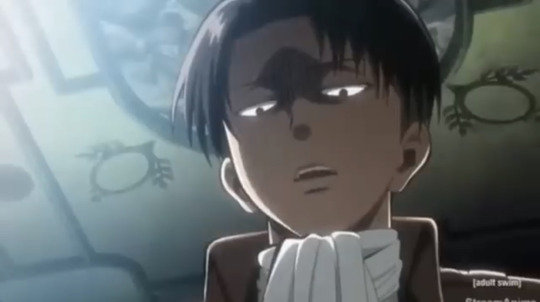
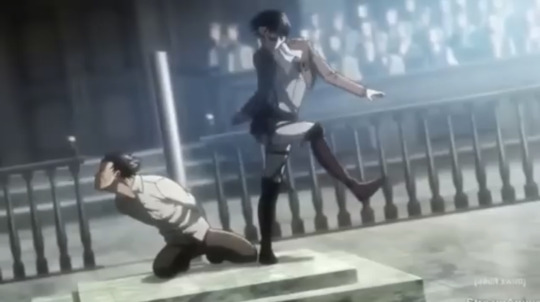
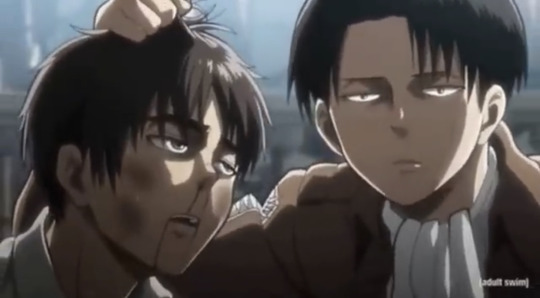
And we get this glorious scene. Levi convinces the court that Eren is harmless to the likes of someone like him. Their best bet is to do what Erwin asked and give Eren to the Scouts. Please.
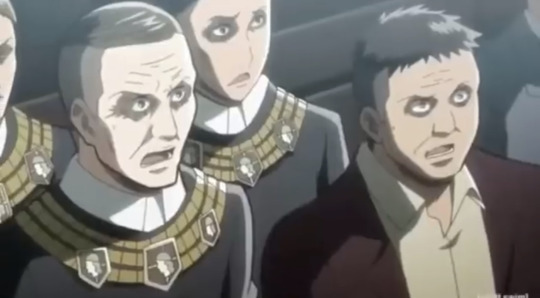
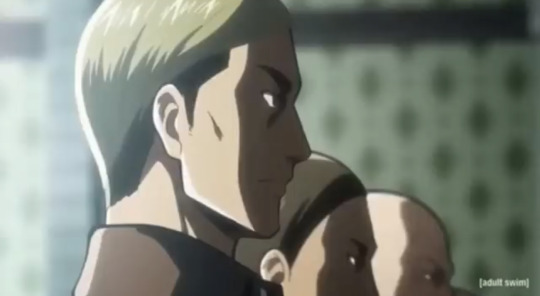
(Notice how Erwin is not shocked, nor does he try to stop Levi.)
Now again, to a first time viewer, this scene feeds into our preconceived notion of Levi. He’s the guy who isn’t deterred by silly things like rank or authority. He saw that things weren’t going Erwin’s way, so he took matters into his own hands. Maybe Erwin will be mad about this later, but Levi will shrug and roll his eyes and say “but I got results, didn’t I?” and Erwin will have no argument for that.
…Right?
Cut to the next scene, after the court has granted the Scouts custody of Eren—and Erwin’s like, “sooo…sorry about that. We had to make it look good.”
This whole thing was planned by Erwin.
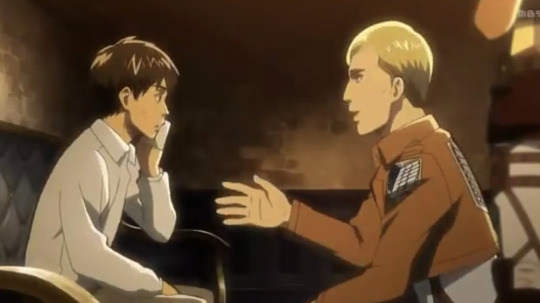
The scene was more or less staged by the Scouts. Erwin wanted to present himself as the calm, collected leader with clean hands. And Levi was the one to do the dirty work, be the brutalizer—even though it was all on Erwin’s orders.
He’ll play that role. He’ll be the rogue, the rough one, the problem child, because his personality fits so well into that niche anyway. But he does it because Erwin wanted him to. If Erwin had wanted him to stand nice and quiet the entire time during the trial, if that’s what needed to be done, Levi would’ve done that instead. He’s not looking to get results; he trusts Erwin’s methods and does what he’s told.
And in this case, he was told to beat up this helpless brat. Gladly.
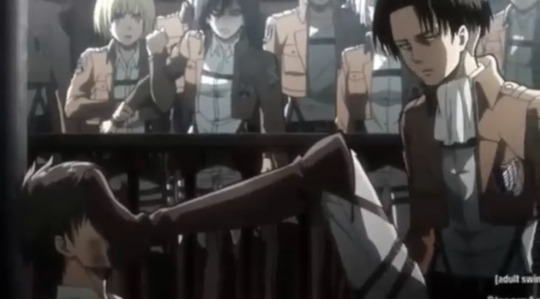
(How much do you want to bet one of the MPs said to Erwin after, “you need to keep your dog under control.” I would simply implode.)
Like, if this display will land anyone in trouble, it wouldn’t be Erwin—it would be Levi. Levi’s the one who got violent and mouthy during a military trial. He broke rank. He attacked the defendant. Erwin isn’t, ostensibly, responsible for this at all. Levi willingly put himself in that position because he trusted Erwin.
And so everything we thought we knew about Levi is turned on its head! Eren even says so in the next episode—he expresses surprise that Levi’s so diligent about following orders.
Eren, silly boy, assumes that being skilled means you don’t have to take orders from anyone. But Levi does. It’s his whole character. (Notice how, despite him ending up being the oldest member of the Scouts, he’s never in line for Commander? He’s the hands, not the head.)
And this whole thing provides so much insight into Erwin’s character as well! Pyxis says at the beginning of the episode that Erwin is very straight-laced. Well, by the end of the episode, we can see that’s…not quite true.
Erwin is conniving, willing to play dirty, do whatever it takes, to get things to go his way. All while keeping his own hands clean, maintaining the image of the honorable Commander. He simply uses the tools at his disposal (Levi) to do the dirty bits for him.
It’s a fantastic introduction to the Scouts, their leader, and his right hand (or is it the left hand that does the dirty work?)
#attack on titan#shingeki no kyojin#levi ackerman#erwin smith#aot#snk#eruri#i am tagging it that but it doesn’t have to be#mymeta#kylerrambles#this of course is not an indictment of either character i LOVE what this says about them!#it’s good character writing!#there! i made a meta post!#feels good to ramble lol
728 notes
·
View notes
Text
Can we talk for a second about how Levi always refers to the members of his squad by their first name. In Japan, referring to someone by their first name is significant. Its more typical to refer to someone by their family name if you don't know them all to well. Close friends even still use honorifics, such as [Name]-chan. There's several instances where Erwin refers to the newer cadets by just their last names, which is typical in a military setting even in other countries, but Levi calls the 104th kids by their names, Armin, Jean, etc.
Levi obviously doesn't care for honorifics or typical social niceties -they didn't really matter where he grew up anyways- but to me him referring to them by their first names -even as they call him Captain (heichou)- means 'we are equals, I trust you'
373 notes
·
View notes
Text
“Are you okay?” Levi asks you.
“No.”
“I know, you don’t look it. What’s wrong?”
“Everything is wrong, Levi. I’m exhausted…I wonder what it’s like to have a brain that functions the way it’s supposed to.”
His eyebrows furrow slightly. “Your brain is fine.”
“But that’s the thing, it’s not!” You say exasperatingly. “It’s wired differently and so it makes everything more difficult. I switch between three modes: Not wanting to exist, Surviving, and Beyond Surviving. Guess how much time I spend in each mode?”
Levi doesn’t say anything in response. His expression shows more concern than confusion this time.
“Fine, I’ll tell you. Most of my time is spent surviving. Some of my time is spent not wanting to exist. And just a little of my time is spent beyond suriving…what kind of life is that?”
Levi’s eyes look at you with sadness. “Not much of one, to be honest…but it’s yours and you only have one.” He counters.
“Well, I don’t even know if I want it half of the time. Y’know, someone told me that life is basically climbing mountains. You climb a mountain, which represents a challenge or obstacle, once you get to the top you enjoy the view for a moment…then you climb back down and do the same thing all over again. Rinse and repeat.”
Levi seems to identify with what you’re saying and he knows you’re frustrated right now but he needs to keep you from spiraling. He’s not letting you give up. That’s not the way. “It’s what we have to do, Y/N.” He says gently.
“And what if I don’t want to do anything? What if I don’t want to climb fucking mountains? What if I don’t want to constantly be challenged and given obstacles? What if I just want to sit at the top of the mountain and just be?”
Levi knows these feelings all too well…he’s wrestled with them a few times throughout his life but he’s continued to push through because that’s what you just do. And you’re going to do the same even if he has to do the pushing for you. You snap Levi out of his thoughts with your next statement.
“It would be so much easier if I just…”
“Stop.”
“But-“
“Stop.” He repeats sternly, his steel eyes boring into yours.
You grunt angrily. “You’re not even real, Levi!” You yell out at him. You’re not angry with him. You’re angry at the world, angry for the universe and your parents for putting you in this predicament, angry for placing you into a world that doesn’t accommodate you. “You are a 2-dimensional character I use to cope. There’s no way for you to actually soothe or help me. You. Are. Fictional.”
Your words don’t seem to phase him. He shrugs. “I’m real enough.”
“What does that even mean?”
“I’m real enough to you. Y/N. You are the one who brings me to life. You are the one who decides how real I should be. What does it matter if I’m not a real person?”
“It’s silly.”
“Who says it’s silly?”
“I don’t know, a bunch of people.”
“Well, fuck all of those people then. Just fuck them.” He states as if it’s obvious.
You sigh. “It doesn’t work that way, Levi…”
“So make it work that way. No one else is keeping you alive but yourself.”
“And you…” You say softly.
Levi shakes his head. “I don’t do anything. Like I said before, you’re the one who does the all the heavy lifting. I exist because you want me to. I function the way I do because you want me to.”
“So I control you?”
Levi rolls his eyes at that. “Don’t be a brat. What I’m saying is I’m just an outlet for you.”
You pause, thinking of his words. He’s not wrong. He’s just a character but he’s also not just a character because of you. “I wish you were real.” You admit sadly.
“I wish I were real too…for you.” He sighs as he runs a hand through his raven hair. “But it doesn’t matter if I’m real or not. I still occupy your brain. I still make you happy, that’s all that matters. As long as you let me live in your mind, I’m always going to be here for you.
You nod, not saying anything further.
“Okay?” He asks.
“Okay.”
“Good.”
#I don’t know what this is I’m just not well I’m on my period and I’m sick and I go back to work in about a day and I just feel awful#Life is SO exhausting and I’m so upset about it#I don’t even know what to title this so I’m not going to#It got a little meta because I also got upset that Levi’s not a real person#Everything’s just a hot mess#I have to laugh because if I don’t I’ll cry#Anyway sorry for this weird ass…whatever it is#As always I hope you find some comfort in it#You’re not alone#We’re all buddies here#levi#levi ackerman#levi aot#levi x reader#levi x you#levi ackerman x reader#levi ackerman x you#levi drabble#levi x y/n#tw: mental health#tw: sui ideation
227 notes
·
View notes
Text
Levi and Post-Traumatic Stress Disorder
TW: mentions of rape and childhood sexual abuse
Throughout the course of Attack on Titan, and even before the canon timeline, Levi experiences innumerable traumas, not the least of which are repeatedly experiencing the deaths of his closest friends and comrades. By the end of the series, Levi has lost every single person he had been close to, being the last of the Survey Corps' veterans. Given the truly immense amount of traumatic events Levi suffers, it'd be difficult to believe that he wouldn't have post-traumatic stress disorder (PTSD), and indeed, he does display several key features of the disorder.
Paraphrased, the DSM-5-TR PTSD criteria are as follows (American Psychiatric Association, 2022, p. 301):
Criterion A: stressor (one required)
The person was exposed to: death, threatened death, actual or threatened serious injury, or actual or threatened sexual violence, in the following way(s):
Direct exposure
Witnessing the trauma
Learning that a relative or close friend was exposed to a trauma
Indirect exposure to aversive details of the trauma, usually in the course of professional duties (e.g., first responders, medics)
Criterion B: intrusion symptoms (one required)
The traumatic event is persistently re-experienced in the following way(s):
Unwanted upsetting memories
Nightmares
Flashbacks
Emotional distress after exposure to traumatic reminders
Physical reactivity after exposure to traumatic reminders
Criterion C: avoidance (one required)
Avoidance of trauma-related stimuli after the trauma, in the following way(s):
Trauma-related thoughts or feelings
Trauma-related external reminders
Criterion D: negative alterations in cognitions and mood (two required)
Negative thoughts or feelings that began or worsened after the trauma, in the following way(s):
Inability to recall key features of the trauma
Overly negative thoughts and assumptions about oneself or the world
Exaggerated blame of self or others for causing the trauma
Negative affect
Decreased interest in activities
Feeling isolated
Difficulty experiencing positive affect
Criterion E: alterations in arousal and reactivity (two required)
Trauma-related arousal and reactivity that began or worsened after the trauma, in the following way(s):
Irritability or aggression
Risky or self-destructive behavior
Hypervigilance
Heightened startle reaction
Difficulty concentrating
Difficulty sleeping
Criterion F: duration (required)
Symptoms last for more than 1 month.
Criterion G: functional significance (required)
Symptoms create distress or functional impairment (e.g., social, occupational).
Criterion H: exclusion (required)
Symptoms are not due to medication, substance use, or other illness.
--
I've indicated the symptoms that apply to Levi, or that I believe likely apply, based on canon content in purple. Let's go one by one.
Criterion A: stressor
During the canon timeline, Levi was exposed to both large amounts of death and threatened death, primarily due to titan casualties, but also due to the circumstances of poverty and deprivation in the Underground. Notable examples include witnessing his mother die and decay while he starved as a young child; Furlan and Isabel's deaths; the deaths of Petra, Oluo, Gunther, and Eld during the Female Titan arc; the loss of Kenny; Erwin and the new recruits' suicide charge against the Beast Titan; and Hange's sacrifice.
Levi experienced multiple instances of serious injury, with the most significant being his injuries resulting from the thunderspear explosion and the Battle of Heaven and Earth. Given the nature of blast injuries, it is likely Levi suffered from internal damage—in particular, rupture of the respiratory and hollow organs, such as the lungs and bowels. We're also shown he suffered complete separation of the index and middle fingers of his right hand, as well as ocular damage to his right eye. A concussion and perhaps a traumatic brain injury following the blast is also likely, as well as hearing damage. Following the Battle of Heaven and Earth, he also experienced significant injuries to one of his legs, necessitating the use of a wheelchair three years post-Rumbling.
In regard to actual or threatened sexual violence, Levi was born and lived in a brothel, in which his mom was a prostitute. It's not an exaggeration to say Levi was likely the result of rape. Given the circumstances of his upbringing, it's also likely he witnessed the sexual encounters between his mother and the brothel's patrons and was perhaps sexually abused himself when his mother was unable or unavailable to protect him. Given the Bad Boy panel previews, we also know he was directly threatened with sex trafficking on at least one occasion.
Only one stressor is required to meet this criterion, and Levi meets all of them. He very much fits the profile of someone with complex trauma or C-PTSD, although that diagnosis has not yet been added to the DSM.
Criterion B: intrusion symptoms
Canon evidence of intrusion symptoms is a bit harder to find, given the heavy plot focus of Attack on Titan; however, I do believe there is enough to make some inferences.
During the Uprising arc, Levi takes note of a starving woman with her baby on multiple occasions, who appears to remind him of his mother. This indicates to me that he thinks of his mother and the circumstances in which he grew up with her with some regularity.
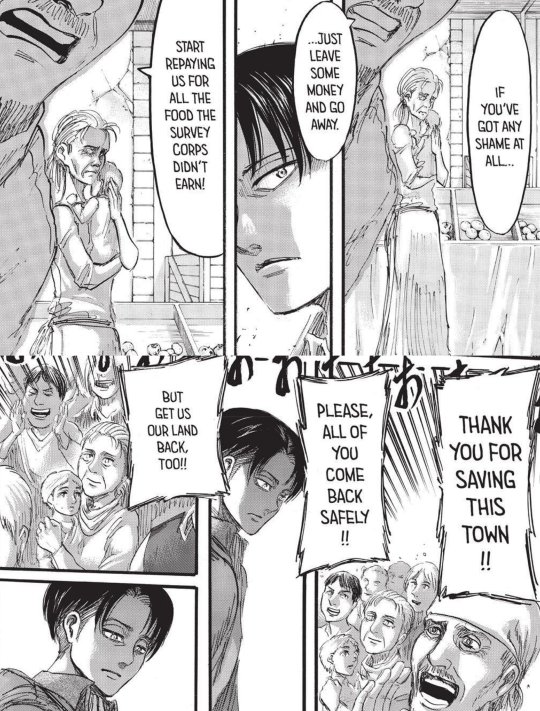
When he later confronts Kenny in the same arc, he specifically questions Kenny regarding the relationship he had with his mother, again indicating that Levi's mother took up significant space in his thoughts.
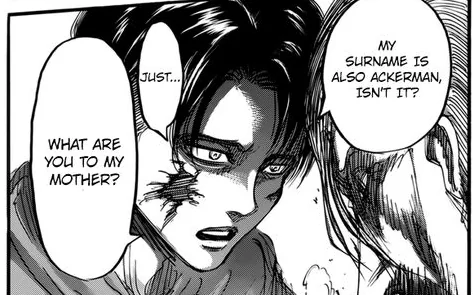
While we know Kuchel chose to keep Levi (rather than abort him), thus indicating Levi was a desired baby, it's evident that Levi's upbringing overall was damaging and distressing due to the severe poverty, food insecurity, and violence he endured as a young child. Accordingly, it's safe to assume that these memories related to his mother were likely to be both unwanted and upsetting.
We also have this panel during the War for Paradis arc, during which Levi ruminates on the deaths of his comrades and the purpose behind having saved Eren's life so many times. His facial expressions are truly crushing and filled with deep despair.
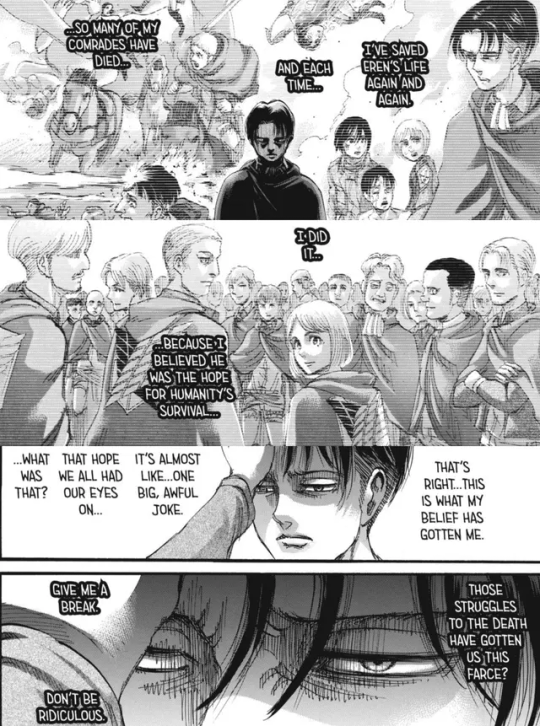
In terms of nightmares, we know that Levi experiences some truly disturbing dreams from the "Smartpass Good Night, Dear and Sweet Dreams Vol. 02" short story, in which he envisions his closest comrades all morphing into a sea of blood on a red carpet. Clearly, the affect of his dream has been influenced by the specter of death constantly looming over him.
Criterion C: avoidance
The full phrasing of this symptom (trauma-related external reminders) is, "Avoidance of or efforts to avoid external reminders (people, places, conversations, activities, objects, situations) that arouse distressing memories, thoughts, or feelings about or closely associated with the traumatic event(s)." Similar to the unwanted upsetting memories symptom under Criterion B, there is not direct canon evidence, but I do believe there is enough to make some inferences.
Primarily, what sticks out to me about Levi is the fact that no one near him seems to have knowledge of his past, which indicates he does not talk about it. When his past is brought up, it's always people who have some direct knowledge about it speaking on it (e.g., Kenny or Erwin). This is shown both directly in canon, such as when Petra speaks to Eren regarding the rumors of Levi's recruitment into the Survey Corps, and in supplemental Smartpass content, like the Close Up interview with Erwin and Levi.
This comes across to me as an effort to avoid conversations, and thus, reminders and memories about the topic.
Criterion D: negative alterations in cognitions and mood
There's quite a lot of evidence for these in canon.
In terms of overly negative thoughts and assumptions about oneself or the world, Levi has plenty. He appears to have the persistent belief that he only exists to be of service and use to others; he views himself as a tool, one which has no value if he is not directly contributing to something. This is exemplified by the following panels:
When Erwin asks Levi if he would be willing to be in charge of keeping the titan serum and determining whom to use it on, Levi answers with, "Why would you bother asking me?" This shows that Levi has no regard for his own personal feelings.
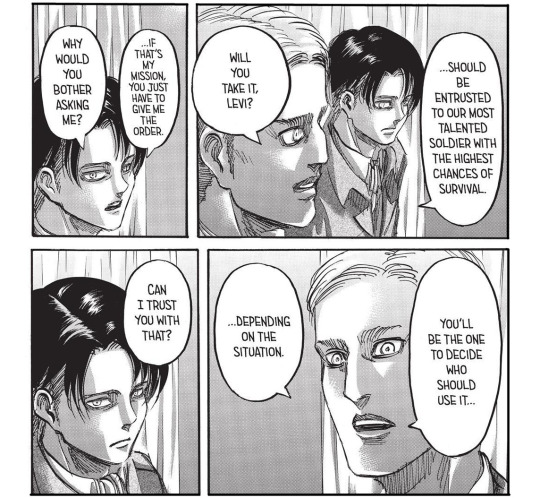
When Erwin and Levi are discussing the plan to take down the Beast Titan during the Reclamation of Wall Maria, Levi expresses his agreement with the plan by remarking that taking down the Beast Titan will act as him "[making] amends for failing to kill that armored brat earlier." This shows that Levi viewed it as his responsibility, and thus, his failure to take down Reiner. He placed an undue burden on himself here, casting blame for outcomes that should not be solely attributed to him.
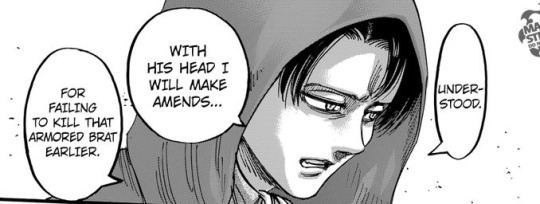
And then there's this panel in the lead-up to the final battle, in which a severely wounded Levi is being reprimanded by Armin for being reckless and not resting, in light of his injuries. Levi responds, "... You want me asleep in bed? You're going to forget I even exist if I rest any longer." Levi suffered truly disabling injuries, and yet, he shows complete disregard for himself—concerned that no one will remember him if he is not actively fighting. This shows a projection of his own lack of self-worth onto how he believes others view him: if he is not useful, then he does not matter. Levi also shows disdain at the concept of resting and having been asleep, as if that's somehow a sign of laziness on his part, which is of course, untrue. No one would have faulted him for resting—he truly needed and deserved to rest.
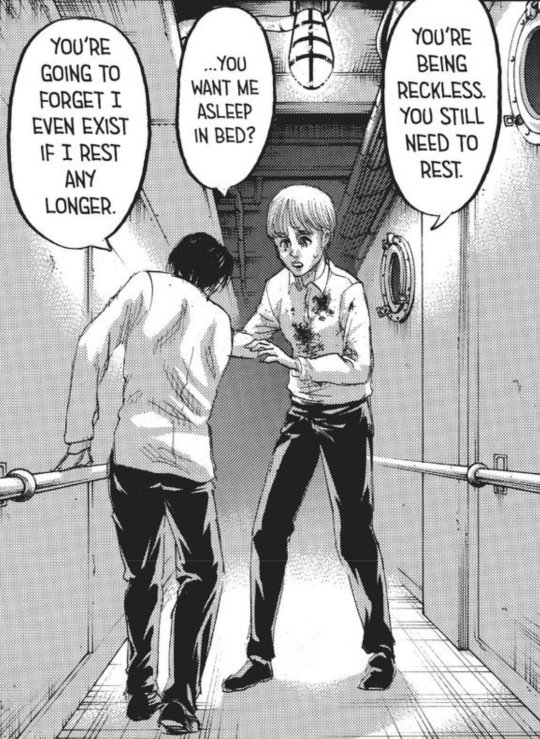
We also know that Levi blamed himself for Kenny leaving him, which can be surmised from interviews with Isayama and the expression on Levi's face when Kenny abandoned him. Levi also asks Kenny why Kenny left him, which shows a certain preoccupation on Levi's part, wherein he worried there must have been something inherently wrong with him to make Kenny leave.
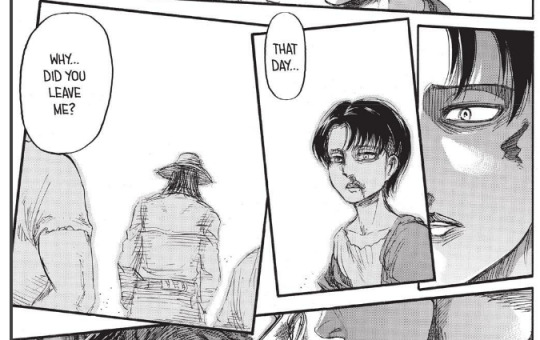
On the topic of Kenny and Levi, Isayama is quoted as saying:
"Levi still had the experience of being separated from Kenny during his childhood. He was constantly troubled by the thought of "Kenny left because I couldn't fulfill his expectations." When the Uprising occurred within the walls, and he confronted Kenny again as an enemy, Levi sought to meet what couldn't be satisfied previously." (x)
Regarding both negative affect and difficulty experiencing positive affect, Levi's expression and mood is frequently shown as depressed. There's a great post by @cosmicjoke on the topic. In terms of the latter, Levi laughs and smiles so infrequently that it's a significant moment at the conclusion of the Uprising arc when he smiles after Historia playfully punches him.

For decreased interest in activities, the full phrasing is, "Markedly diminished interest or participation in significant activities." Levi's character is contrasted with all the other characters in the series in the sense that he has no dreams of his own. Both Armin and Hange have that greater curiosity about the unknowns of the world, represented by the sea and titans; Erwin is similar in that he desired to validate his dad's theories about the outside world and the existence of other humans; Eren craved freedom above all else; etc. Levi, on the other hand, is never shown as having those same dreams and ambitions. Hence, I would say he demonstrates a markedly diminished participation in significant activities, as even though his complete lack of self-interest is immensely admirable, it is also deeply tragic—particularly as dreams and ambitions are often crucial for one's psychological well-being.
And then we also have feeling isolated, for which the full phrasing is, "Feelings of detachment or estrangement from others." On the topic of Levi and relationships, Isayama is quoted as saying, "It’s likely because he is afraid of forming close relationships. Because he exists in a world where one can be eaten by a Titan at any time, he consistently avoids building 'family'-like connections with others." (x)
This manga panel is a good example of how Levi views himself as detached from others. Pay attention to the phrasing: "And I doubt normal people think about these things on a daily basis... So that means I'm abnormal... Probably because I've seen far too many abnormal things."
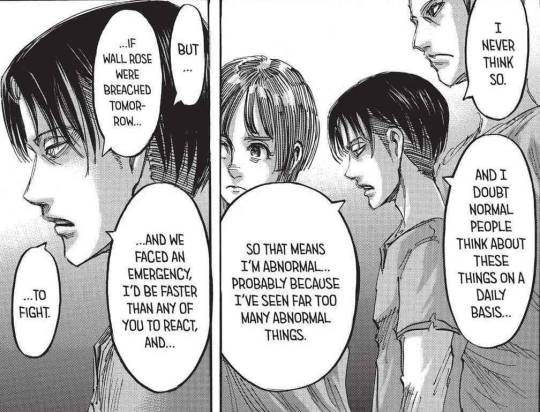
Criterion E: alterations in arousal and reactivity
With all of the above laid out, Criterion E becomes very easy to meet.
For irritability or aggression, this is one of Levi's known character flaws, borne as a result of his upbringing.
For risky or self-destructive behavior, we have clear instances of Levi engaging in battle to the detriment of his physical well-being.
For hypervigilance, the last manga panel I attached provides a good example of that.
For difficulty sleeping, Levi is famously an insomniac, often quoted as getting 2-4 hours of sleep a night.
Criterions F, G, and H: duration, functional significance, and exclusion
Have the duration of Levi's symptoms been greater than one month? Yes.
Do the symptoms result in distress or functional impairment? Yes.
Are the symptoms more attributable to the physiological effects of a substance or another medical condition? No.
Thus, Criterions F, G, and H are met.
Citations
American Psychiatric Association. (2022). Trauma- and stressor-related disorders. In Diagnostic and statistical manual of mental disorders (5th ed., text rev.).
#attack on titan#shingeki no kyojin#levi ackerman#medium: anime/manga#anime: snk#c: levi ackerman#my thoughts#snk meta#I wrote this instead of doing my grad school work#goodness poor Levi#He suffers so much
76 notes
·
View notes
Text
Levi, Emotional Expression, and Social Interaction
I've seen different posts on Levi lately across different platforms that claim he is a cruel or mean person, which are fundamental misunderstandings of his character. I sort of see the problem as people mistaking Levi's emotional expressions (or lack thereof) as indicative of malicious intent or rude behavior. As such, I wanted to discuss how Levi's history and trauma have shaped how he expresses himself and relates to others. Once one has an understanding of that, it becomes evident that Levi's expressions should not be used to judge his intentions or feelings.
I wrote another post on how Levi fully meets the criteria for post-traumatic stress disorder (PTSD) on my main blog, and that diagnosis is important for understanding Levi as a character, as he's someone who's been largely affected by his trauma. To further expand on that post, we're going to discuss both Levi's affect and his ways of socially interacting with others, using concepts such as social modeling and self-monitoring.
What is Emotional Affect?
Affect, in psychology, refers to a patient's expression of emotion. Expression of emotion encompasses facial expressions, gestures, body language, tone of voice, etc. Mood, on the other hand, refers to the internal state of a patient's emotions sustained over a period of time. Affect helps us interpret a person's mood; however, there are such situations where affect can be considered inappropriate—that is, the person's affect is not entirely congruent (i.e., consistent) with the person's present mood and/or situation. A classic example of inappropriate affect would be laughing at a funeral, as that is incongruent with the context of the situation. Another example—a patient who is smiling and laughing after being involuntarily committed is considered to have an inappropriately euphoric affect.
Affect can be described across multiple dimensions, but the two most typically used are the quality of affect and the range of affect. Quality of affect is typically categorized as either euthymic (normal), dysthymic (depression, anxiety, guilt), or euphoric (an abnormally elevated sense of well-being, such as in mania). The range of affect can be labeled as labile, broad, restricted, blunted, or flat. Broad is considered the normal range of affect.
For the purposes of conciseness, we're going to focus on blunted and flat affects, as those are the range of affects that are best suited to describing Levi. Flat affect is when there is no variation in the patient's emotional expressions, regardless of their mood and situation. Blunted affect is similar, but it is a bit less severe—it means minimal variation. Practically, what do these mean?
Levi's Affect
When Kenny first finds Levi as a child, Levi is in a severe state of neglect; he is dying of starvation, he is wearing rags, his hair is unkempt, and he is sitting in the same room as his mother's decaying corpse. A typical child in this developmental range would be in extreme distress: crying, expressing fear, pleading for help, etc. However, Levi shows no such displays of emotions; he does not cry, he does not move, and he barely speaks. In fact, there is absolutely zero emotional expression, and there is no indicator he is upset about his situation (even as it is clear he must be). This is flat affect. Even in the short montage we see after Kenny has taken Levi under his "care", Levi never once shows variation in his emotional expression—no anger, no laugher, nothing.
Once Levi is an adult during the present timeline in the series, Levi exceedingly rarely displays his emotions. He often speaks in monotone, minimally varying the tone or volume of his voice—never yelling as well, even when angry. His smiles are so rare that it's a notable moment when he does smile (such as when Historia punched him at end of the "Royal Government" arc), and he never cries even after significant personal losses (except his one tear at the end of the series). His affect as an adult ranges from flat to blunted. This is significant too because we do know that his mood does vary, as it's clear from his verbal and body language the toll that different events take on him, and he does also display a sense of humor across the series. Again, though, his emotional expression does little to reflect how he's feeling.
What Causes Flat Affect?
To give a quick list of the most common causes:
Schizophrenia and other psychotic-spectrum disorders
Brain damage, such as from organic brain pathology or a traumatic brain injury
Neurodevelopmental disorders, such as autism spectrum disorder (ASD)
Severe psychological trauma, typically resulting in post-traumatic stress disorder
Major Depressive Disorder (MDD)
I will say outright that there is no evidence Levi suffers from schizophrenia, and thus, that is unlikely to be the cause of his flat/blunted affect, especially given the onset of Levi's flat affect and the exceeding rarity of childhood-onset schizophrenia. Similar reasoning applies to brain damage, so both of those can be excluded from the differential.
I do believe Levi meets the criteria for MDD in adulthood; however, that would be more so a comorbidity of his existing PTSD. Levi looked to be around 4-6 years of age at the start of Kenny's flashbacks, and MDD in that age group is quite uncommon, even when accounting for childhood-onset and adolescent-onset depression.
This leaves us with both severe psychological trauma and ASD as the two most likely causes of Levi's flat affect as a child and through adulthood. ASD can be a valid interpretation of Levi's significantly reduced affect display during childhood, as well as his consistent social difficulties throughout all of canon. Based on criteria laid out by the latest edition of the Diagnostic and Statistical Manual of Mental Disorders (DSM-5-TR), Levi can be seen as having ASD (which I'll likely make a future post on). However, the presence of severe psychological trauma confounds this diagnosis. Despite this confounding diagnosis, it is still possible he has both PTSD and ASD.
Regardless, the most likely explanation for Levi's range of affect remains severe psychological trauma. In a child that young, something had to have gone extremely wrong in his early upbringing for his significantly reduced affect display. An entire separate post can be written on this topic, but Levi demonstrates clear signs of an insecure attachment style by the time he's discovered by Kenny; this indicates that Kuchel, despite having loved Levi, was simply unable to properly care for him, and this resulted in deep and ingrained psychological trauma that affected Levi's ability to socially relate and interact with others for the rest of his life. I intend on going into more detail in a separate post, but Levi's attachment style is likely insecure-avoidant or insecure-disorganized.
Observational Learning and Social Modeling
Albert Bandura's social learning theory posits that children learn through a combination of traditional behaviorist processes (classical and operant conditioning), cognitive processes, in addition to observation and modeling. In reference to Levi, observational learning is the most salient aspect of this theory.
In simple terms, observational learning refers to the way children observe the people around them. Individuals observed are referred to as models. Models can include, but are not limited to, parents/caregivers, TV characters, school teachers, and friends within a peer group. Basically, children pay attention to these models and encode their behavior into their memory. At a later time, this behavior is then imitated. This is referred to as "social modeling".
Who were Levi's models? Kuchel, Kuchel's patrons at the brothel she worked at, Kenny, and others who lived in or frequented the Underground City.
Given Kuchel's circumstances and the danger of human trafficking in the Underground, it is likely she taught Levi to avoid interacting with anyone in order to ensure his safety. Kuchel's patrons, in all likelihood, abused her and Levi was most assuredly witness to this abuse or the effects of it in some way. Then, Kenny—Levi's most significant parental figure—was a prominent serial killer who displayed and actively taught Levi violence.
All of this points to Levi never having had the opportunity to learn proper social interaction. In fact, he was actively taught inappropriate and unhealthy ways to socially interact. Not only was Levi's emotional development stunted and severely impacted as shown through his lack of affect, but his ability to socially interact and relate to others was inhibited due to both his insecure attachment and the absence of appropriate social models. How does this manifest in Levi?
Self-Monitoring
Self-monitoring is the degree to which people monitor and adjust their self-presentations when interacting with others and across different social contexts. Whether someone is a high or low self monitor can be affected by their natural personality, their experiences growing up, and/or their neuropsychobiology.
High self monitors tend to be actively aware of the social image they are projecting, and they will be adept at responding to social cues. They will also vary the image they project dependent upon who they are interacting with and what the social circumstances are. They have greater concern over situational appropriateness, and they are often perceived as more friendly and pleasant by others.
In contrast, low self monitors tend to exhibit emotional expressiveness and social responses more congruent with their internal states regardless of social context. That is, they do not adjust their beliefs, attitudes, and dispositions to be more socially acceptable. As such, they are often perceived as rude, socially awkward, and/or unaware of others' social needs.
Levi is a low self monitor. Regardless of who he is interacting with or what the situation is, he consistently maintains the same attitudes and beliefs; he is always honest and says what he's feeling. He never adjusts his social tone, even when it would make him more appeasing to others. Throughout the series, he's often referred to as rude, socially awkward, a lunatic, etc. for his inability to self-monitor. This is a likely a result of the aforementioned psychological trauma, his lack of appropriate social models, his innate introverted nature, and his potential ASD.
Summary
My goal with this post was to explain how Levi's trauma and experiences growing up have formed the way he expresses himself and interacts with others. Levi never sets out to be seen as rude, unkind, or cruel. In fact, I'd say he is by far the kindest and most compassionate character in all of Attack on Titan. However, because of his social disposition, he is consistently misperceived by both characters in the series, as well as readers/viewers. Levi, through a combination of his innate nature and the environment in which he grew up, simply lacks the social skills and affinity for social interaction to properly explain himself and come across as more palatable to others.
Note: I am a doctor of psychology student, so much of this information has been informed by my schooling.
#attack on titan#shingeki no kyojin#levi ackerman#aot#snk#attack on titan meta#shingeki no kyojin meta#Levi Ackerman meta#aot.text#aot.meta#my thoughts#c: levi ackerman#meta.levi#text.levi
119 notes
·
View notes
Text
I wanted to talk about this scene for a while now:



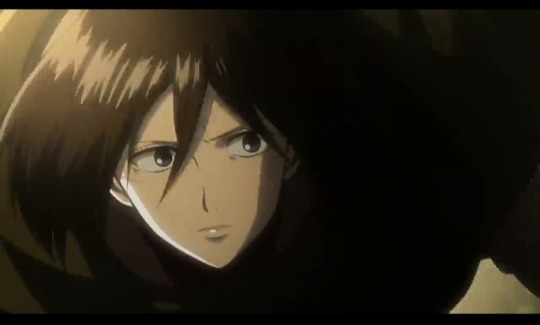
First of all, when Mikasa obviously very upset and raged up by female titan kidnapping Eren, she vents her anger out by blaming Levi for not being able to do his job of protecting Eren. I don't think she knows much about how the whole squad got killed by Annie.
But, Levi instead of snapping at Mikasa or getting offended by her furious statement, he chooses to not react on it. He just saw his squad dead and is definitely depressed.
The look on his face after Mikasa said that, turns grim and he looks too tired. He looks like that while returning from expedition and facing Petra's dad too. I think, the statement actually hit him more than it shows. It looks like he ignored it, but the grim look said otherwise.
He was definitely blaming himself for not reaching out there in time to save his precious squad members and was already suffering from their loss of lives. And Mikasa's statement worked like lemon on wound.
He didn't react, it's not like him. He also is a very understanding adult, for he chooses to not think Mikasa as rude for saying that. He understands she is just 15 and how Eren is a special person for her, having him taken away and endangered always make Mikasa recklessly furious. But also, I think, he thought that those words were true, he thought that it was his shortcoming for not reaching there on time.
He understands that he can't save everyone, but it's this sad realization for him that pains him the most. Being called humanity's strongest and then not being able to wondrously saving them. He sure lost and sacrificed the most, considering his closest people and friends are all dead.
He is too selfless and goal oriented ( saving and protecting humanity) that he won't wallow in self pity and he never did strike me as someone who would ponder over things he couldn't control, he did rather do something productive and make a difference. But this feeling of not being or doing enough definitely always there somewhere in his mind, he just brushes it off and focuses on what he can still do.
He lost his whole squad too, but he chooses to put aside his pain and understand Mikasa's. He was never the one to complain about his life either. He is just to selfless to do so.
This scene was a really good point for his character, how he is an understanding and thoughtful adult. How he does get affected by deaths severely and doesn't show it. How he might actually blame himself for not being able to save lives.
I don't think Levi would have too much guilt, in a way Erwin did. But he definitely sometimes blame himself for what's lost, that is not even his fault. And just shows how even a person who has been through and seen so much deaths and suffering, can still be so vulnerable to it.
Levi has treated every life as precious and meaningful, loss of this life he considers so precious and not being able to do anything, when situation is totally our of his hand, can make him depressed too. As I already said, he would still brush off those thoughts and not ponder on it. He would rather do whatever he can to help, to make sure that those lost lives weren't in vain.
For Levi not only life has meaning and worth but death does too, he will do everything in his power to give meaning to both the lives and deaths of his comrades.
#levi ackerman#attack on titan#aot#levi aot#levi attack on titan#levi#shingeki no kyojin#levi fanart#levi character analysis#kikarou rambles#aot meta#kikarou metas
133 notes
·
View notes
Text
people like to characterize levi as the guarded one, and while that's not an unfair assessment, levi is emotionally guarded, not personally guarded. levi is unflinching in his pursuits, his values, he leaves nothing to the imagination. he's unapologetically himself and regardless of what happens he can't seem to shake his internal drives: his continued belief in fighting for better, in honoring others, in acting in service of things beyond him.
its actually erwin who i feel is the inverse, erwin is clinical, he's constantly crafting, which doesn't negate his sincerity, one of his major components is sincerity, but its an obligatory thing, smth afforded to others. erwin uses service as a mechanism to achieve his actual ideals, whereas levi is driven by service as an outlet for his individualism. however, erwin's passion is what makes him such a good leader. naturally.
eruri are both on the introverted side, hence their symmetry, the onus of externalization and adjustment is eliminated, they're attuned to one another. levi provides certainty and erwin direction. and they both feel safe within that, however, bc erwin had to kill a key part of himself, burying his deviance in order to ascend, he defers to half-truths and obfuscation, its a safety mechanism, the only way attaining power to realize his true passion was possible. the passion we see is only residual, indicative of the flame that truly burns within.
erwin affords only glimpses.
he's paradoxical in that — an at heart withdrawn, observant kid with a fire bright enough to fashion him into the devil. someone subsumed by that which they buried.
he internalizes all the horrors and lets little else color him in the eyes of others bc they have been his persistent norm, he buries his in actuality, juvenile and senseless self, and in doing so, the person he sees as a paragon, the person who the people idealize sees one often framed as cold and unfeeling by others as the truly elevated one, bc in burying his own light, erwin is able to see it in levi.
#eruri#aot meta#erwin x levi#erwin smith#levi ackerman#shingeki no kyojin#aot eruri#snk eruri#levi aot#captain levi#aot erwin#commander erwin#aot#snk
144 notes
·
View notes
Text
Armin’s character and what he represents about bravery within the story means so much to me.
I feel like so often in shonen and general action story media traits like ‘bravery’ and ‘courage’ are considered synonymous with strength or risk-taking- and that’s certainly accurate in a lot of cases. But just like in so many other ways, AOT subverts or critically examines this trope within its characters- particularly in the main trio of the cast.
It’s so easy to reduce Armin to his easiest defined trope- the smart one- and while that’s definitely true and you could write a million meta essays on his intelligence, strategic thinking, etc, I think we don’t talk enough about the ways Armin’s character begs the audience to reexamine what it means to have strength and bravery.
Armin’s strength is not in the physical realm (although it’s worth dedicating another post entirely to the fact that Armin is certainly not that weak either- simply the weakest of an already exceptional group) and his strength is not solely his mind either. But also his determination, conviction, and the way he is willing to sacrifice himself to save others with hardly a second thought- all while not being as rash as Eren and Mikasa can be.
In a recent rewatch of the Trost Arc, there were so many moments that stood out to me that I had previously either taken for granted or not noticed the significance of. In that arc alone, after Eren’s “death” -
He follows Mikasa without hesitation to rescue her when she runs out of gas
Offers Mikasa his gas canisters and blades knowing he won’t survive without them
Defends Eren to the Garrison (this is obviously a pretty big moment that isn’t usually overlooked, of course)
Rushes off from the decoy squad and runs the ENTIRE length of the Trost district wall when he sees the red smoke flair- just to be there to help Mikasa and Eren
Stays by Eren’s titan form on foot in a titan infested area right before he places the boulder
And there’s probably some more I missed.
Armin at this point in the story has no false confidence about his ability to survive- in fact he probably has an abysmal lack of confidence that he can’t affect much, but he does it anyway.
(Obviously, this self-sacrificial tendency reaches a head and ultimately culminates in the sacrifice of his life in the mission to retake Shiganshina…)
All of this to say, what Armin represents about bravery and courage is so important to me because he dedicates his life with the purest of intentions- he is not scared of death in such a noble way and he brings it up again and again. He would die for the cause- nearly does.
Which I think creates an interesting parallel between him and Eren in the sense that Eren is frequently referred to as a “suicidal maniac”- clearly meant to refer to the reckless way he rushes into danger. Whereas Armin’s instinct towards self-sacrifice is never viewed this way, because it’s not a glaring flaw in the same way that Eren’s behavior is.
Another way the story examines this is through his interactions with Annie- who is opposite in that she is fiercely dedicated to her own survival at any cost. This is brought up in their interaction during the ODM gear inspection when she asks him if he would die if someone ordered him to and he easily answered that he would. Armin’s ability to understand this difference between himself and Annie without judging her for it is also unique to him.
Because Armin doesn’t expect anyone else to give their life or view others as cowards for not rushing into danger- because he sees the value in every life. He just feels the cost of his own life would be worth it to preserve someone else’s. It’s this love for humanity and unwavering optimism at the core of his character that gives him so much conviction.
And like so many others have pointed out, this is what saves him (and, to an extent, later the world) in the end when it comes to Levi’s choice to revive him. Erwin was successful because he was able to set aside his humanity and sent countless soldiers to their deaths to gain victory. Armin, more than anyone else in the story, was able to plan and make a difference in such a way that always assumed he would either ask others to take an equal risk or put himself at more risk to reach the goal. And he wasn’t driven by anger, hatred, or rage to do it.
Clearly, there’s a lot that can be said about the way Armin shows strength and bravery in dire situations without being, stereotypically, the strongest character- or even the die-hard risk taking typical protagonist that Eren represents for most of the story.
But I think ultimately the story is trying to show us that Armin’s version is the version that is within reach for everyone- and that will make the biggest difference in not just winning a battle but in making a better world. And it’s so important to me that AOT- despite being such an inherently violent story- took the time to present that message as emphatically as it did.
#armin arlert#eren yeager#annie leonhart#levi ackerman#erwin smith#aot meta#aot analysis#long post#character analysis#this is the result of three days of brainrot rattling my skull#armin is best boy material but like in a viscerally literary way okay?
64 notes
·
View notes
Text
I really want to know the situation in which Levi's Ackerman powers awakened. Even more so at what age. Was it after Kenny took him in and before his abandonment? Or afterward? Was Levi completely alone and had to deal with it, having no clue what happened and no one else to talk about? Life in the underground certainly wasn't a safe experience for him but there had to have been this one special moment in which everything went to shit even more so that awakened it for him.
somehow I don't think it would have been during his starvation after his mother passed. Although that does fit as a life and death situation, it doesn't seem to be enough of a spur of the moment, fight or flight moment for it to awake
66 notes
·
View notes
Text
ppl don’t talk enough about the fact levi is somewhat morally grey. he’s not perfectly on the side of objective good at all times, and he’s not a pure hero willing to fight tooth and nail for everyone.
in the uprising arc, the MP levi squad captures tells levi to trade all their lives for the scouts who’ve been arrested so they can live. levi says no, and that some lives are more important than others.
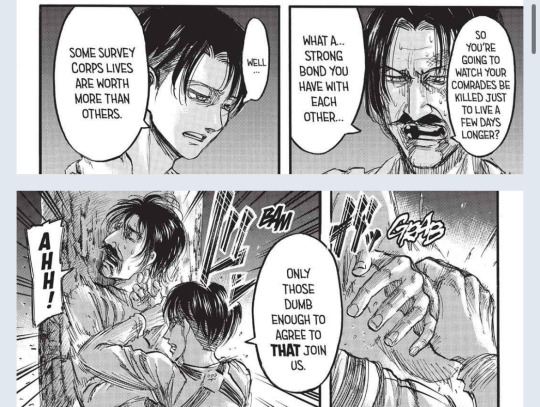
to win, sometimes the choice has to be made to let some people die, even if it’s ones he cares about. he’s like erwin in that way.
“‘Take no risks’. Make no sacrifices’. There is no room for such convenient conversation. if there was such a thing, it wouldn't be realistic.”
levi has tortured, and killed people without much of a thought. the reason he and hange tortured sannes for “no reason” was a technique to get him to talk later. it’s horrible but it’s to a worthy end.
does levi like it? of course not, but he doesn’t stand up and do what he feels is right, because there’s a *best* right he needs to strive to reach. he keeps his head down and follows the orders he’s given to that end.
also, in order to survive in the underground there’s definitely a laundry list of bad things he’s done, and not all as understandable as stealing food from a company who can stand to lose some.
he has a sadistic side too. such as the way he shredded zeke’s body over and over as he kept healing, and what he said to annie after she killed his squad. he believes in an eye for an eye without mercy.


after no regrets he let go of much of his arrogance and pride, but he’s not blameless. he doesn’t just curse and get irritated easily. he can be cruel. he has done things warranting feeling ashamed of, but all the same he’s determined to live having no regrets, even though there’s room for shame deep down that he doesn’t let himself feel. that’s mostly what it comes down to.
but levi isn’t perfect. he’s sympathetic but he isn’t forgiving; he doesn’t want to see the world burn, but he will commit violence without hesitation, and sometimes enjoy it; he’s humble, but he knows his own worth enough to save himself if the situation called for it.
#this same thing can be said of every aot character… but that’s a post for another day#levi aot#snk levi#captain levi#captain levi ackerman#levi ackerman#levi rivaille#rivaille ackerman#aot meta
128 notes
·
View notes
Text
Armin's Role in Levi's Choice, and the Threat of Erwin's Corruption and Mental Degradation:
Alright, boys and girls, I'm going into this again, because I want to focus specifically on an aspect of Levi's choice in Shinganshina which, sadly, I'm reminded over and over again by people, is widely misunderstood or flatly ignored, and that's both Armin's pivotal role in Levi choosing as he did, and also, Erwin's own impending mental and moral collapse.
People often accuse Levi of letting his personal feelings for Erwin get in the way of making the "right" choice that day in Shinganshina, and they support this claim by making the further claim that Levi hampered humanity's chances for victory by letting Erwin die, Erwin being the great leader that he was, etc, etc... This view is shared, not unironically, I think, by everybody's favorite AoT character, Floch, who we know is a bastion of human empathy and understanding (insert sarcasm here). Because if we should believe anybody about what was really motivating Levi that day, it should be Floch, (insert further sarcasm).
But I say no to these accusations, because they're undeniably refuted by what transpires in the panels of the manga itself.
Now, lets look at these panels, because we're going to analyze and break this down:


Erwin admits to Levi here that seeing what's in Eren's basement, "learning the truth about this world", as he says, is more important to him than humanity's victory. And Levi's response to that is to say "Fine. Erwin, I'll trust your judgment.". Meaning that he's trusting Erwin still to do the right thing, to make the right choice, and should things go south on them, and humanity's victory is compromised by Erwin's judgement-call, then the responsibility for that will be on Erwin and Erwin alone. Levi is both reaffirming his trust in Erwin as a leader, while also acknowledging that Erwin is suddenly, uncharacteristically, threatening to compromise the mission of the Survey Corps for selfish gain. Something which goes against every belief Levi has ever held about Erwin as a leader and a man. Levi's anger and frustration is rooted in that shaking of foundation, in the uncertainty that he now has to confront about Erwin's fitness as a leader.
What's important to remember about Erwin and this moment, is that it isn't the first instance in which he's prioritized his own, personal dream above humanity's victory. He did so as well when he orchestrated the military coup, overthrowing the nobility. Erwin admits this to Zackely, when he confesses that he isn't sure if overthrowing the nobility was really the best move for humanity, and we start to see the first cracks in Erwin's otherwise impenetrable armor.
His insistence, here, that he'll be going on the mission to Shinganshina, is the second instance in which he's placing his own, personal dream above humanity's victory.
Where before Erwin had never once compromised the SC mission for his personal dream, he's now done so twice, in short succession.
Levi, before this, had spoken with Kenny about dreams, and dreams ability to corrupt and compromise us as human beings. And we're seeing that in action here with Erwin. His dream has begun to corrupt him.
But Levi doesn't realize yet how deeply the corruption in Erwin has begun to take root. Hasn't, in fact, yet accepted that corruption in Erwin at all. He's beginning to suspect it, but he still believes in Erwin as a leader. He still trusts his judgment, as he says. He's still deferring to Erwin's judgment over his own instincts.
And Levi won't realize how deep the corruption in Erwin goes, and won't accept it, until the pivotal moment of decision, up on the roof in Shinganshina.
Now let's talk about these panels, because these are vital in understanding what Levi decides next.

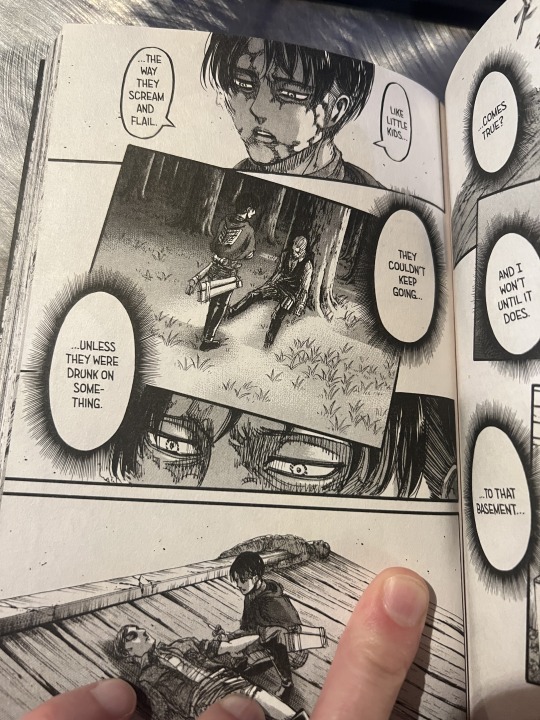
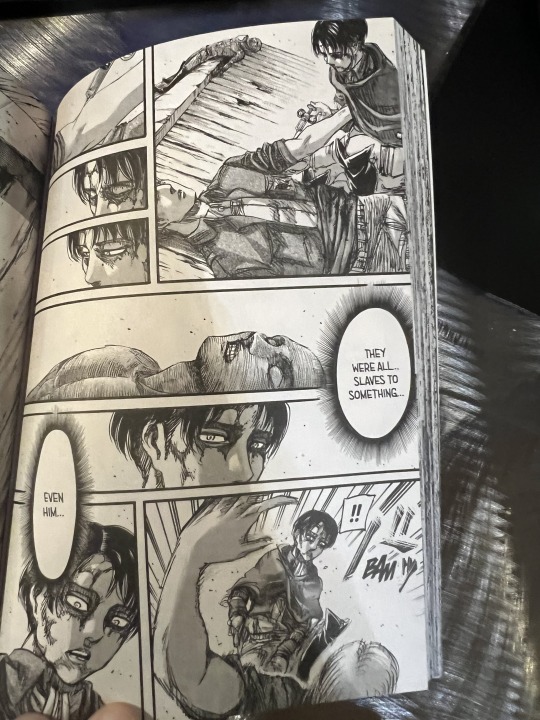

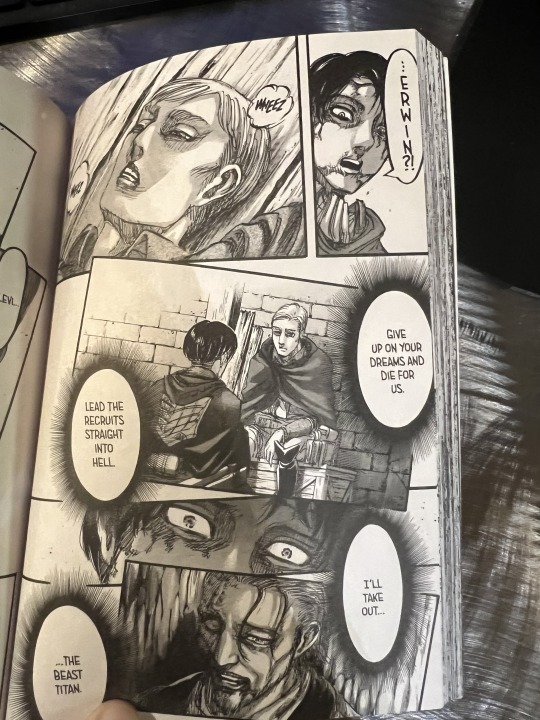
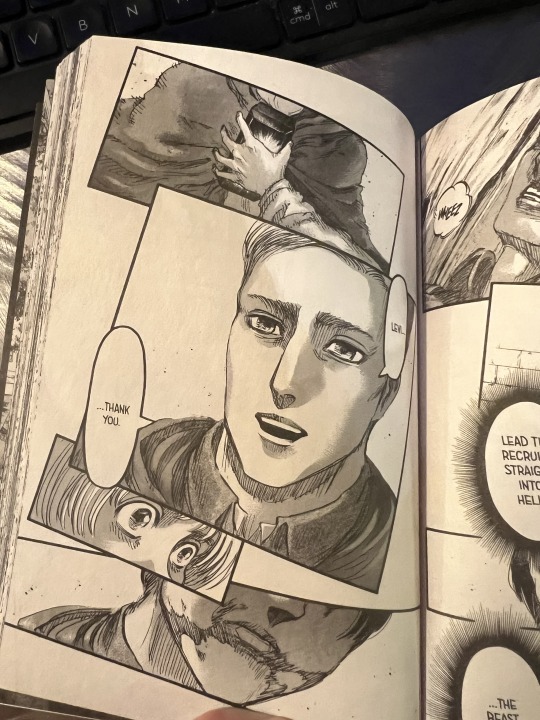
The juxtaposition here of Erwin, Armin and Kenny means everything.
Levi remembers asking Erwin what happens next, once he discovers what's in Eren's basement, and Erwin admits that he doesn't know. All he knows is that he wants desperately to see what's in that basement, and after that, he has no idea. There's no grand plan, no further motivation, no vision for the future of humanity.
Then Levi recalls Kenny's words about dreams, "they couldn't keep going unless they were drunk on something", and this memory is followed by Levi's looking over at Armin's charred body, with Kenny's words ringing in his head "They were all slaves to something. Even him.". We then see Erwin's hand lift up, symbolically smacking the serum away from his arm, and he begins to ramble incoherently, lost in a memory of asking his father how he knows humanity doesn't exist beyond the walls.
It's in THIS moment that Levi realizes that Erwin hasn't been released from the grip of his dream. In his delirious, dying state, it's exposed as the thing that still drives Erwin forward, the thing that still matters to him most. His dream still has him shackled. His dream is still corrupting him.
Again, we've already seen this corruption begin to take root and manifest in Erwin making decisions which directly compromise and endanger humanity's victory, first in orchestrating the military coup, and then in insisting on being in Shinganshina himself.
Levi recalling Kenny's specific words "They were all slaves to something. Even him." is him realizing that Erwin is a slave to his dream. That he can't and won't be able to let it go. He recalls having to order Erwin to do so, to "give up on your dreams and die for us", and then Erwin thanking him for that. He realizes Erwin thanked him because Erwin knew he wouldn't have been able to make that right choice on his own. He realizes that if he hadn't made the choice for Erwin, Erwin wouldn't have been able to give up on his dream. Instead, he would have given in to the corrupting force of his dream, and chosen it over humanity. Just like he did the night before, when he refused to back down from his insistence that he accompany the mission. When he refused Levi's request for him to stay behind.
Levi realizes that Erwin has already been corrupted by his dream. And he realizes that once that dream is realized, Erwin will no longer have anything left to motivate him forward, nothing to be drunk on to keep him from the further degradation and corruption of his mind. He'll no longer be the great leader and visionary he'd once been. He'll be a husk of himself, ruined by the selfishness of his dream, and the guilt he carried as a consequence. Eaten alive by his own demons.
We see this in direct contrast to Armin's burned body, and Levi's memory of his hopeful and innocent eyes from the night before, talking about his own dream of seeing the ocean.
This contrast is majorly important in understanding why Levi ultimately chooses to give the serum to Armin and not Erwin.
Because unlike Erwin, Armin WAS able to give up on his dream and die for humanity. He didn't need anyone to make that choice for him. He made that choice by himself. He willingly sacrificed his life for humanity, and willingly accepted that he would never get to see the ocean, content with the hope that Eren would get to see it in his stead.
Levi realizes, in that moment, that unlike Erwin, Armin hasn't been corrupted by his dream. It wasn't the only thing driving him forward. He wasn't "drunk" on it. He could give up on it for the sake of everyone else. He could sacrifice it.
And that plays a major role in why Levi chose as he did.
It wasn't a case of him prioritizing Erwin over humanity. It was a case of understanding that Erwin's sacrifice, in the end, wasn't self-motivated, and that his dream still controlled him, and would continue to control him, and that truth wouldn't change when he finally realized his dream, but simply leave him bereft, with nothing to shield him from the crushing guilt which had begun to seep in with the realization of his own selfishness, his increasing willingness to prioritize his dream over humanity.
It was a case of Levi realizing that Armin's ability to give up on his dream was also a marker of that's dreams purity, and Armin's own innocence and lack of corruption as a person.
It was a case of Levi realizing that where it was already too late for Erwin to escape that fate Kenny had talked about, it wasn't so for Armin. He reiterates this later on, when he talks about choosing Armin because he "had the same look in his eyes as all of you", meaning his comrades at the beginning of all of it, before they'd been beaten down and ruined by the ugliness of war and dreams.
It was as much that lack of corruption in Armin that made Levi's choice for him, as it was the corruption which had taken root in and begun to eat away at Erwin.
In order for all of their sacrifices to have been worth it, as Levi later says, it would have to have been for an absurdly idealistic world. What that means is, it would have to be for a dream that was pure and without corruption. That's the only thing that would make all of their sacrifices worth it in the end.
And Armin's dream was pure and without corruption.
The very thing they were fighting for was the purity that Levi saw in Armin. Very literally and figuratively, Armin encapsulated the ideal the members of the Survey Corps had given up their lives for. That absurdly idealistic world. A world of freedom and free will and choice.
To choose Erwin would have been a betrayal of that ideal, because Erwin was a slave to his dream. He'd become the very thing the Survey Corps was fighting against. Enslavement.
Armin was a slave to nothing. To choose him was to prove the worth of every fallen soldiers sacrifice. To choose him was to realize the dream they'd all died for.
191 notes
·
View notes
Note
hello, i’m back, i was just wondering what you think eren said to the others in the paths. we saw armins and mikasas but not the other scouts/warriors. you’re pretty much the only writer on tumblr that doesn’t intimidate me so i asked you 👍 (your wife needs to be tied to a tree)
Hello again behyuu xD But please! Don't fear clouds, she's just a smol smol! Go befriend her!
But this is a really interesting question; I've thought about it a few times, and more along the likes of: "what is the kind of relationship Eren shares with these people?"
(Edit; this became incredibly long 🥲)
I think there are people Eren would and wouldn't have talked to, really. In the latter category falls Levi, imo. But that takes off on another tangent entirely, so for now we'll stick to the rest.
To Reiner, I like to believe Eren would've shown him an alternate reality of what happened in Liberio, perhaps one where he doesn't transform, and instead has a long conversation with him where both of them are offered something akin to "forgiveness" by one another.
These two are parallels to each other in that mutual sense of crippling guilt that came with carrying out the destruction of each other's homelands, not out of hatred, but simply because they needed to do it, in order to achieve something bigger. Reiner, because he wanted to fix his family and become an honorary Marleyan to rid himself of the shame. Eren, because his "peaceful world" for lack of a better word, was turned upside down and trampled upon - though in the end, it was just his selfish and violent nature that set him off on this path. Reiner and Eren understand each other in a way that others don't - neither wanted to do what they did. But they did do it, and that sin will simply be too massive to contain. But Reiner lives despite not wanting to, and Eren dies despite not wanting to, and they are split into two different worlds by the end.
Tl;dr - They talk about how, in another world, where maybe there aren't titans, Eren would've continued to admire Reiner as he did before Trost. And Reiner would cry. End of story.
With Pieck, I hc that the conversation would've been short. Pieck is a very interesting character, imo, because she's literally the most grounded of all the scouts and warriors. She owes no allegiance to Marley, nor Paradis, doesn't have an ulterior motive and is basically stuck watching the doomed world from the ground. There is no solution for her - she as an Eldian will be used by Marley and killed in Paradis - she's literally the only character who understands this from the very beginning. That said, her impression of Eren is, simply put, that of an immature child running riot (incidentally, this is also what Levi probably thinks). If we take into account the fact that her first meeting with Eren was one where she tried to fool him by channelling her (fake) solidarity with Paradis and rejecting her Marleyan upbringing, what lies between these two characters is the anger of being born on different sides of the wall. Eren's actions also resulted in Pieck losing pretty much everybody she knows. As such, I believe what could've transpired between them in the paths, would've been an apology from Eren for destroying Liberio, for killing Udo and Zofia, and telling her maybe, that had these suffocating walls between them never existed, perhaps they would've been peaceful strangers, passing by on the streets now and then.
With Jean and Connie, the conversation would've been very difficult. Sasha. How do you talk about Sasha and forgiveness in the same sentence? So Eren was tortured by his fate, by having to see everything play out as he'd seen it, without any change, and Sasha's death was one of the many terrible consequences - doesn't negate the fact that it still happened only because he "chose" this path. All the people in the 104th truly have an incredibly tight bond - it is what makes it all the more painful knowing that Eren drifted away until he had to be killed by the very same group of people. I like to imagine Jean and Connie beat him up, really. Among the many female characters in SnK, Sasha was someone with an incredibly pure soul - she cared about people and food and fun - and her death was catastrophic. Eren's selfishness caused it, there's no other way to put it. There's also the dynamic between Jean and Eren - that love-hate rivalry that was so sad to see end. And so I want to believe Jean and Connie just keep pummeling him until they're all tired and they stare at the sunset, reminiscing on all the times Eren was a reckless piece of shit.
Falco and Gabi then. The former will honestly carry the guilt of ferrying Mr. Kruger's letters to and fro, during Eren's homeless era. In this respect, I like to think that Eren will tell him not to carry it, to blame it all on him, because he's the one that lied and made him do it. What can possibly be worse than willingly inflicting guilt on a child as young as he once was? Let Eren be cool for once, and offer this reassurance. How Falco deals with it as he grows up, is another story. As for Gabi - the textbook example of brainwashing, she is a splitting image of Eren in so many ways. Eren however, did not allow himself to find the acceptance that Gabi did. And so perhaps what he tells her, is that he's glad. Glad that she joined the alliance to stop him. It's enough that there's one Eren in the world.
Who's left?
Ah. Annie.
This is honestly very interesting to me because, first of all, I just know that the minute Eren opens his mouth in Paths, Annie's knee is going to dislocate his jaw. She has not one iota of sympathy for this pathetic loser causing so much trouble, making her fight when she didn't want to, but because he dragged his dearest friend (and her future husband ffs) into the chaos. He wasn't. Letting. Her. Be. In. Peace. Oh she's going to snap a few bones and put them in a blender, I know it, I know it!
But jokes aside! Annie and Eren are also, a bit similar in some respects. Both are selfish, incredibly so, it's only that their end goals are vastly different in scale. At the same time, they are also both people who care for their loved ones, even if they don't openly show it. They see themselves as monsters, but are loved by the people around them nevertheless. Annie never really had anything like a real childhood, and the concept of having friends was something unnecessary and foreign in her terrible upbringing. I really think that it was only in Paradis that she found comfort, some warmth, what food tastes like when shared with people that treated her more or less the same as anybody else, and so learned to open up (very slightly). But still having a wall around her to keep potential threats at bay and to conserve her energy, it must've felt quite special when Eren appreciated her fighting skills and even took them to heart, making an effort to learn for himself. At a time when she probably prided herself on her strength and fighting prowess alone and nothing else, that could've been incredibly validating.
She didn't hate Eren. She thought of him as a moron, but she didn't hate him. She didn't really hate anybody, the way Eren also never "truly" hated anybody. They were just forced at each other's throats by his choice. We have to remember that Eren also didn't find it easy to accept that Annie was the FT. He did really look up to her and admire her.
I like to think he understood her dedication to sticking to her mission, not as being loyal to Marley, but for a reason more personal (not sure if he could've known about her father, post gaining his future memories..?) and that, that in itself, isn't wrong. Eren's selfishness also stems from an incredibly personal desire after all.
So what would they talk about? Maybe he'd tell her she should continue to be selfish. Because her desires, unlike his own, are harmless. And also drop hints about how his, um, his best friend Armin, is very smart and also very hot and maybe she'd like to... Um... Idk? <3
Whew 🥲
Edit2: I forgot Historia. Idk, considering she'd just given birth and was probably conked out with exhaustion, it's nice to think he'd have just watched her holding her baby, sadly, whispered "You're free" and then disappeared.
#ask#behyuu#if you squint you will find VBEOW spoilers#because i have a bad habit of sticking every one of my headcanons in my fics#attack on titan#meta#eren jaeger#armin arlert#annie leonhart#pieck finger#reiner braun#jean kirstein#connie springer#gabi braun#falco grice#levi ackerman#character analysis#shingeki no kyojin#aot#snk#aruani
33 notes
·
View notes